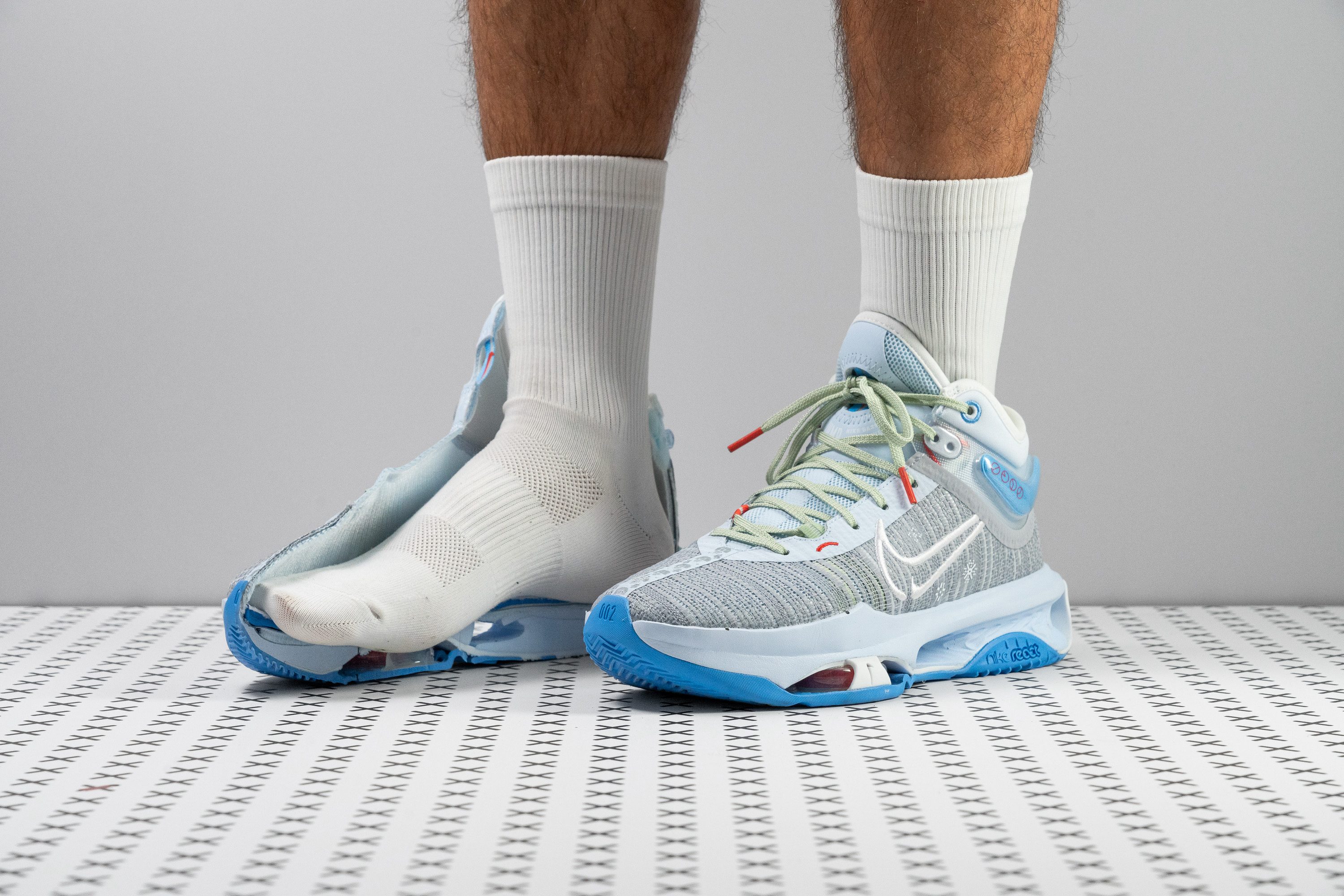Our verdict
- Top pick in best Nike basketball shoes (2024)
Pros
- Charged and snappy toe-offs
- Outstanding impact protection
- Dependable grip on clean courts
- Solid support and stability
- Very secure foothold
- Highly breathable upper
- Fits to a T
Cons
- Zero court feel
- Not for outdoor courts
- Heavier than average
Audience verdict
- Top 27% in Nike basketball shoes
Comparison
The most similar basketball shoes compared
+ + Add a shoe | |||||
|---|---|---|---|---|---|
| Audience score | 88 Great! | 84 Good! | 82 Good! | 84 Good! | |
| Price | $180 | $190 | $170 | $125 | |
| Shock absorption | High | High | Moderate | - | |
| Energy return | High | High | Moderate | - | |
| Traction | Low | Low | Low | - | |
| Top | Mid | Mid | Mid | Mid | |
| Ankle support | ✗ | ✗ | ✓ | ✓ | |
| Weight lab | 15.6 oz / 442g | 13.1 oz / 370g | 15.7 oz / 444g | 15 oz / 426g | |
| Lightweight | ✗ | ✓ | ✗ | ✗ | |
| Breathability | Breathable | Breathable | Moderate | Breathable | |
| Outsole durability | Bad | Decent | - | - | |
| Drop lab | 6.4 mm | 6.0 mm | 7.2 mm | 8.1 mm | |
| Heel stack lab | 35.6 mm | 32.8 mm | 27.9 mm | 29.5 mm | |
| Forefoot | 29.2 mm | 26.8 mm | 20.7 mm | 21.4 mm | |
| Size | True to size | Half size small | Slightly small | True to size | |
| Midsole softness | Soft | Balanced | Firm | Balanced | |
| Stiffness | Stiff | Stiff | Stiff | Stiff | |
| Torsional rigidity | Stiff | Moderate | Moderate | Moderate | |
| Heel counter stiffness | Moderate | Moderate | Moderate | Flexible | |
| Width / fit | Medium | Medium | Medium | Wide | |
| Toebox width | Medium | Wide | Medium | Wide | |
| Midsole width - forefoot | Average | Average | Average | Average | |
| Midsole width - heel | Average | Average | Average | Average | |
| Heel padding durability | Decent | Decent | Decent | Decent | |
| Toebox durability | Decent | Decent | Good | Decent | |
| Insole thickness | Average | Average | Average | ||
| Outsole hardness | Hard | Average | Hard | Soft | |
| Outsole thickness | Thick | Average | Average | Average | |
| Heel tab | None | None | Finger loop | None | |
| Ranking | #23 Top 43% | #38 Bottom 29% | #48 Bottom 11% | #37 Bottom 31% | |
| Popularity | #24 Top 45% | #19 Top 36% | #27 Top 50% | #52 Bottom 3% |
Who should buy
Don't miss out on the Nike G.T. Jump 2 if you are in search of the following:
- a ton of cushioning and shock absorption (for big guys)
- explosive rebound for jumps (especially for centers and power forwards)
- the most innovative approaches to cushioning
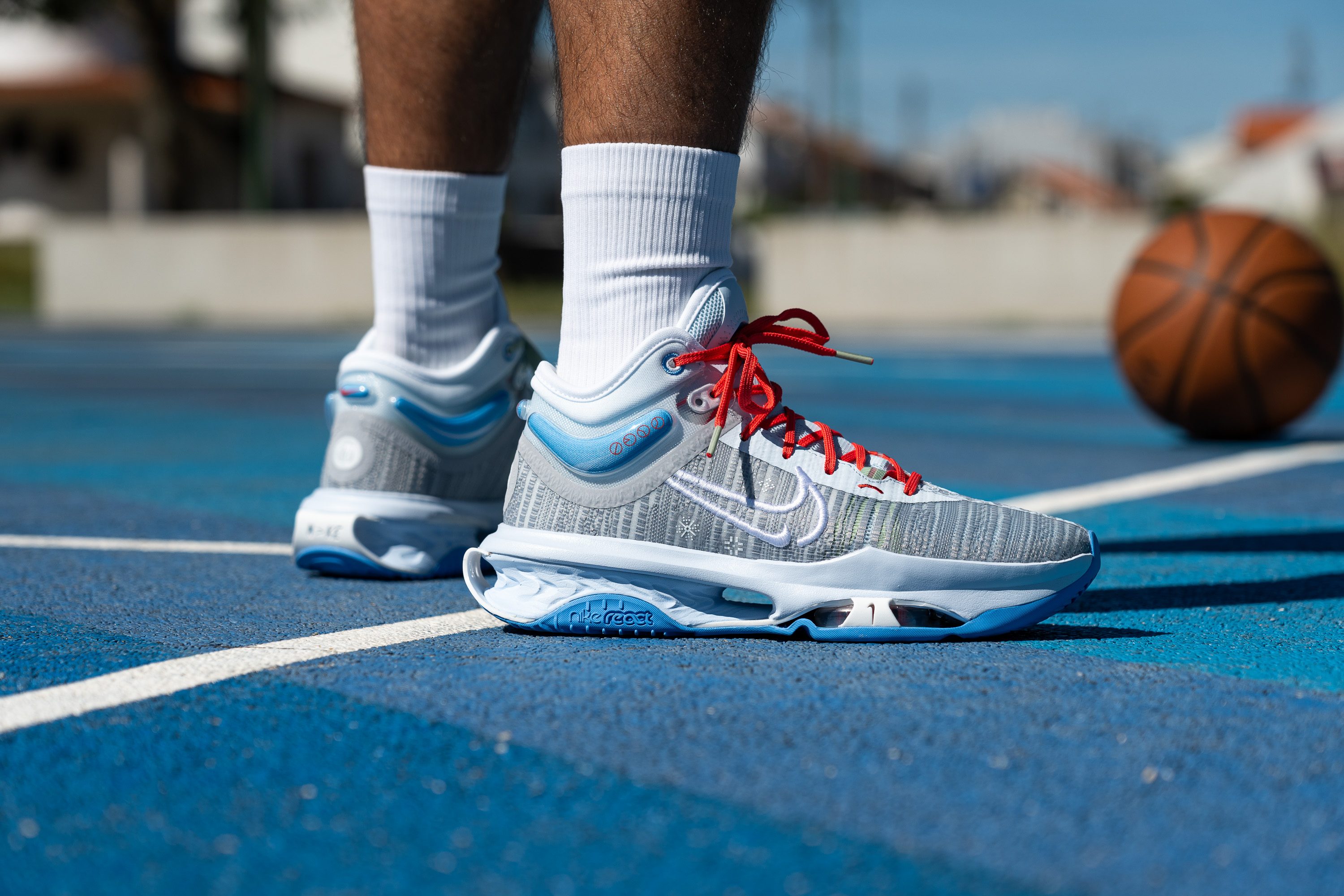
Who should NOT buy
If you are a quick guard with a nimble playing style, then the G.T. Jump 2 is the exact opposite of what you need.
We believe that you will appreciate a better ground feel in a much lighter package. Have a look at the Nike KD 16 or the Jordan Tatum 1 instead.
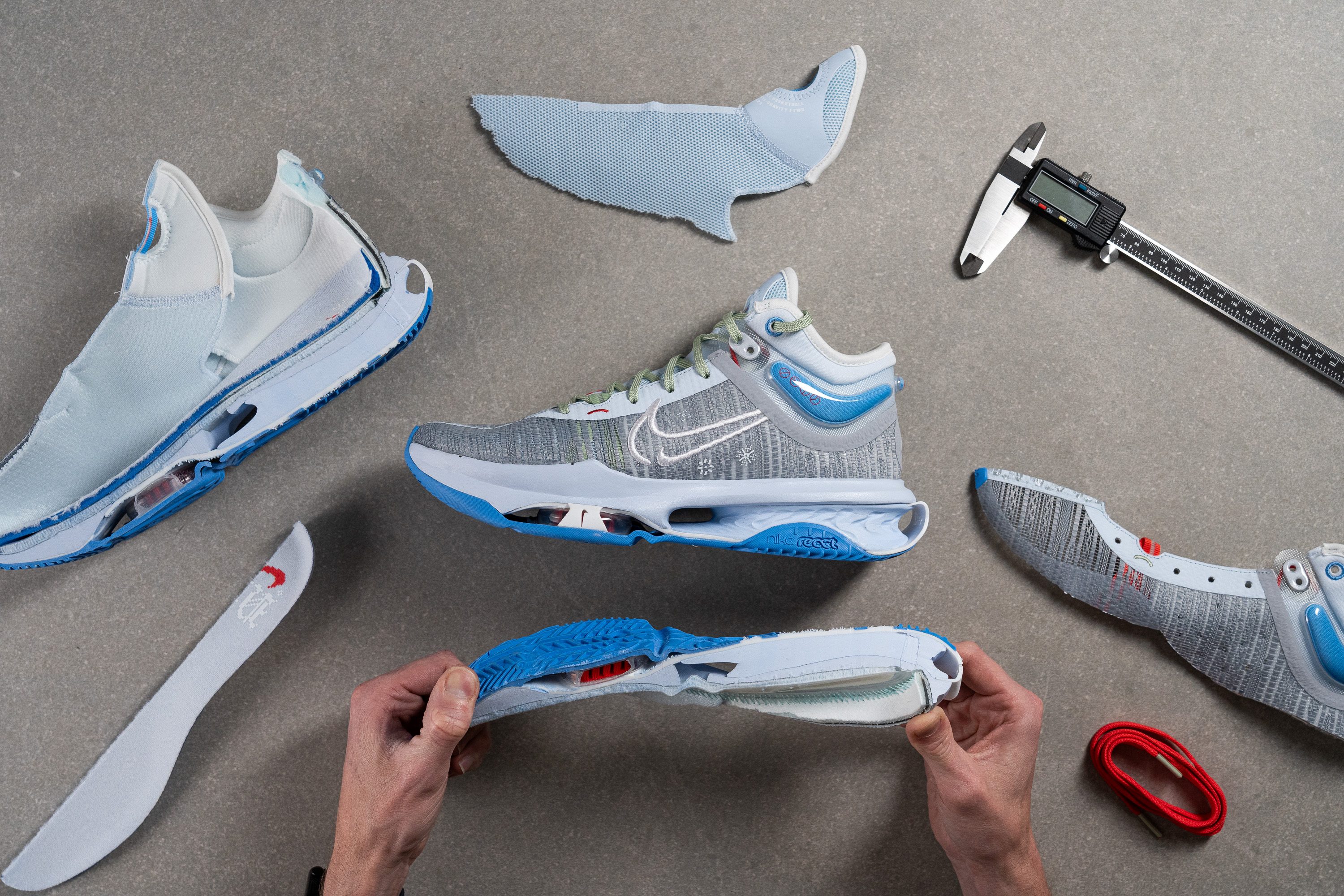
Cushioning
Shock absorption
Without any exaggeration, the G.T. Jump 2 offers the highest level of impact protection of all the basketball shoes we've tested!
With a very generous helping of Nike React foam, it returned the highest shock absorption scores in both the heel and the forefoot. No matter how big of a player you are, you can trust this massive platform to soften the blow of the hardest landings in the paint.
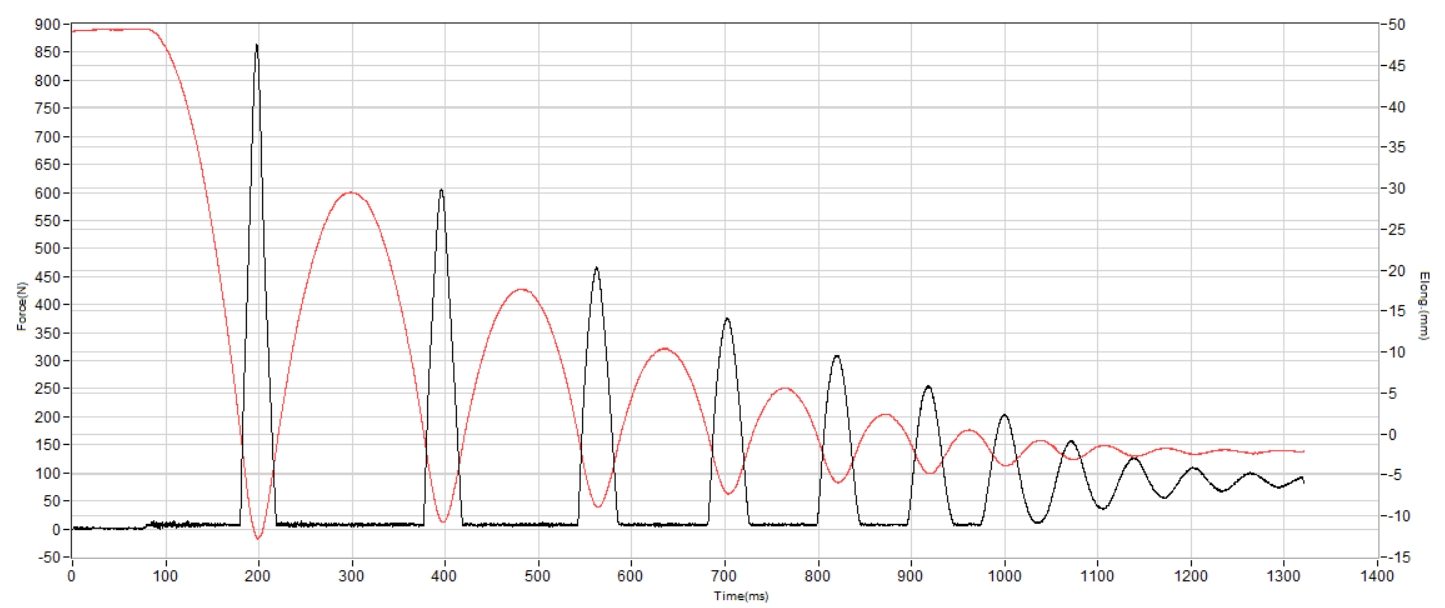
| G.T. Jump 2 | 121 SA |
| Average | 103 SA |
Energy return
But you don't merely sink into all that luxurious foam - the shoe launches you straight back with its powerful Zoom Air units and a full-length Zoom Air strobel.
However, Nike's claim that the G.T. Jump 2 can add centimeters to your vertical jump is somewhat inflated as its energy return is only slightly higher than average at 60.1% in the heel and 64.6% in the forefoot. If we are talking about extreme explosiveness, the G.T. Hustle 3 is currently leading with 81.5% in the forefoot.
| G.T. Jump 2 | 64.6% |
| Average | 62.1% |
Heel stack
On foot, the Nike G.T. Jump 2 feels very high off the ground. But it is not a surprise given how much focus Nike gave to the shoe's cushioning setup.
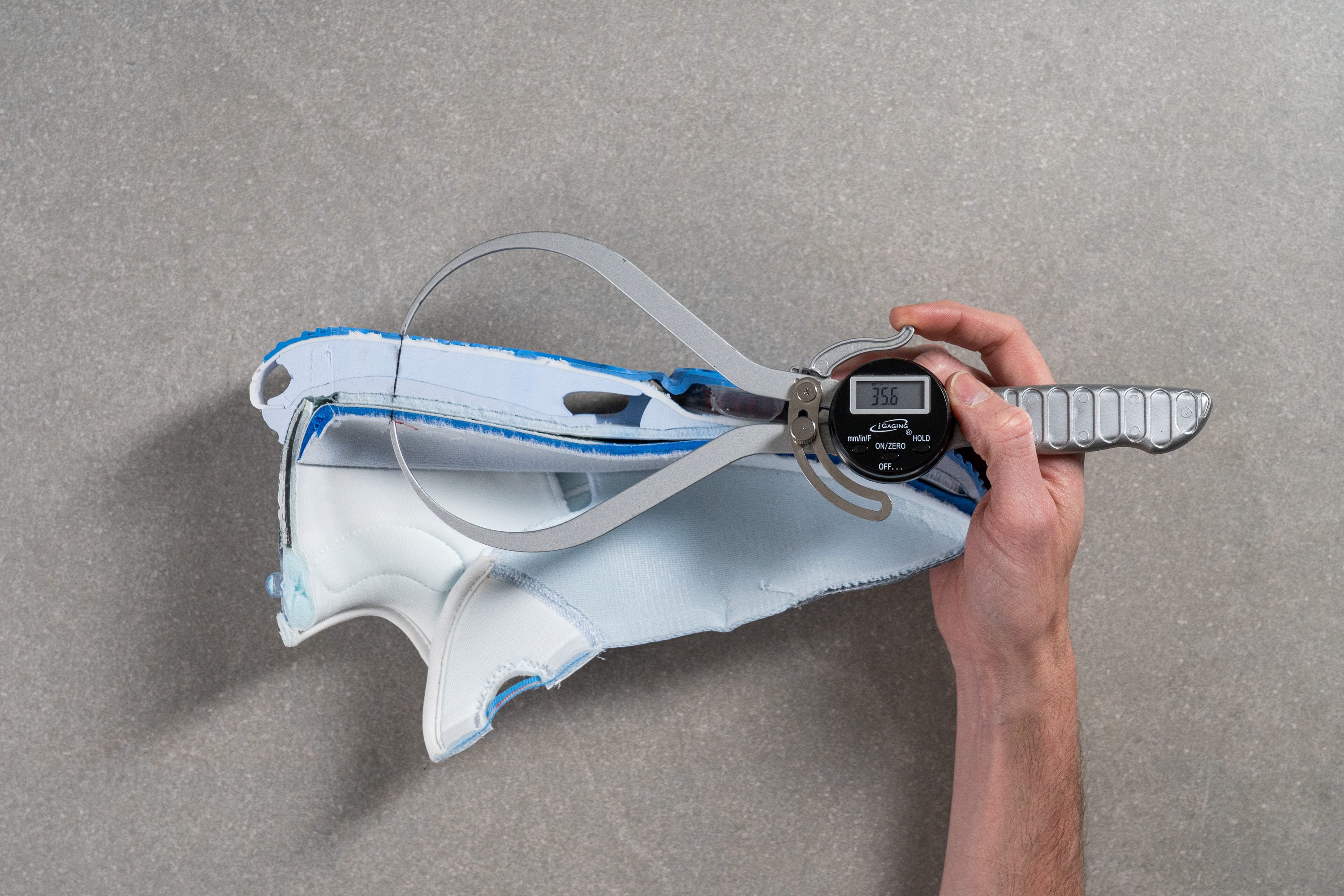
Measuring its heel stack height with a caliper, we got 35.6 mm which is over 5 mm taller than average! In fact, it is taller than 93% of our lab-tested hoop shoes so far!
| G.T. Jump 2 | 35.6 mm |
| Average | 28.8 mm |
Forefoot stack
With two massive Air bubbles in its forefoot and a Zoom Air strobel on top, the G.T. Jump 2 also has some of the thickest forefoot stacks we've seen! No, wait, it is THE thickest we've ever seen!
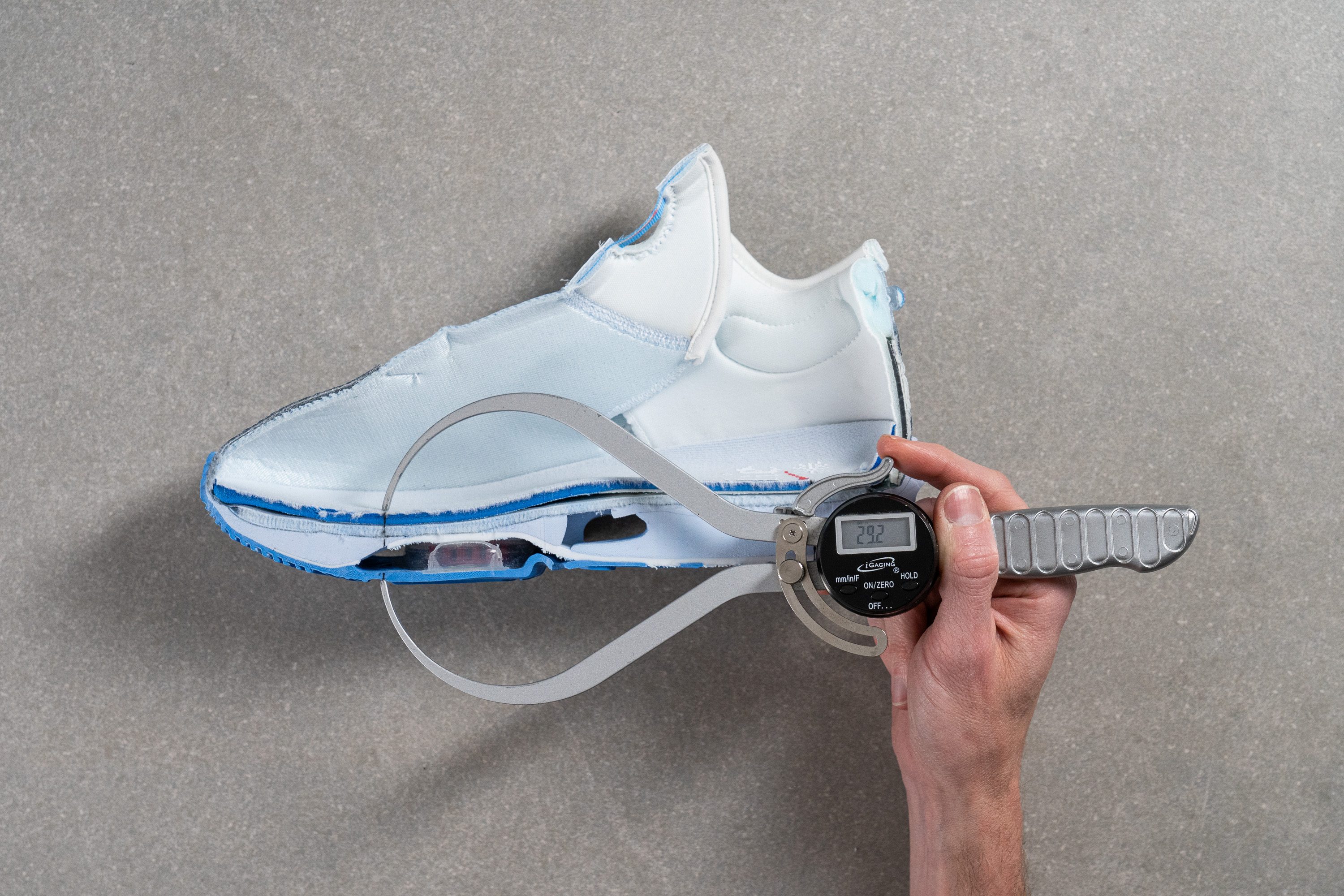
With a caliper measurement of 29.2 mm, the shoe is as thick in the forefoot as some other basketball shoes are in the heel.
| G.T. Jump 2 | 29.2 mm |
| Average | 21.4 mm |
Drop
Measuring the shoe's heel-to-toe drop, we got a slightly lower-than-average reading of 6.4 mm.
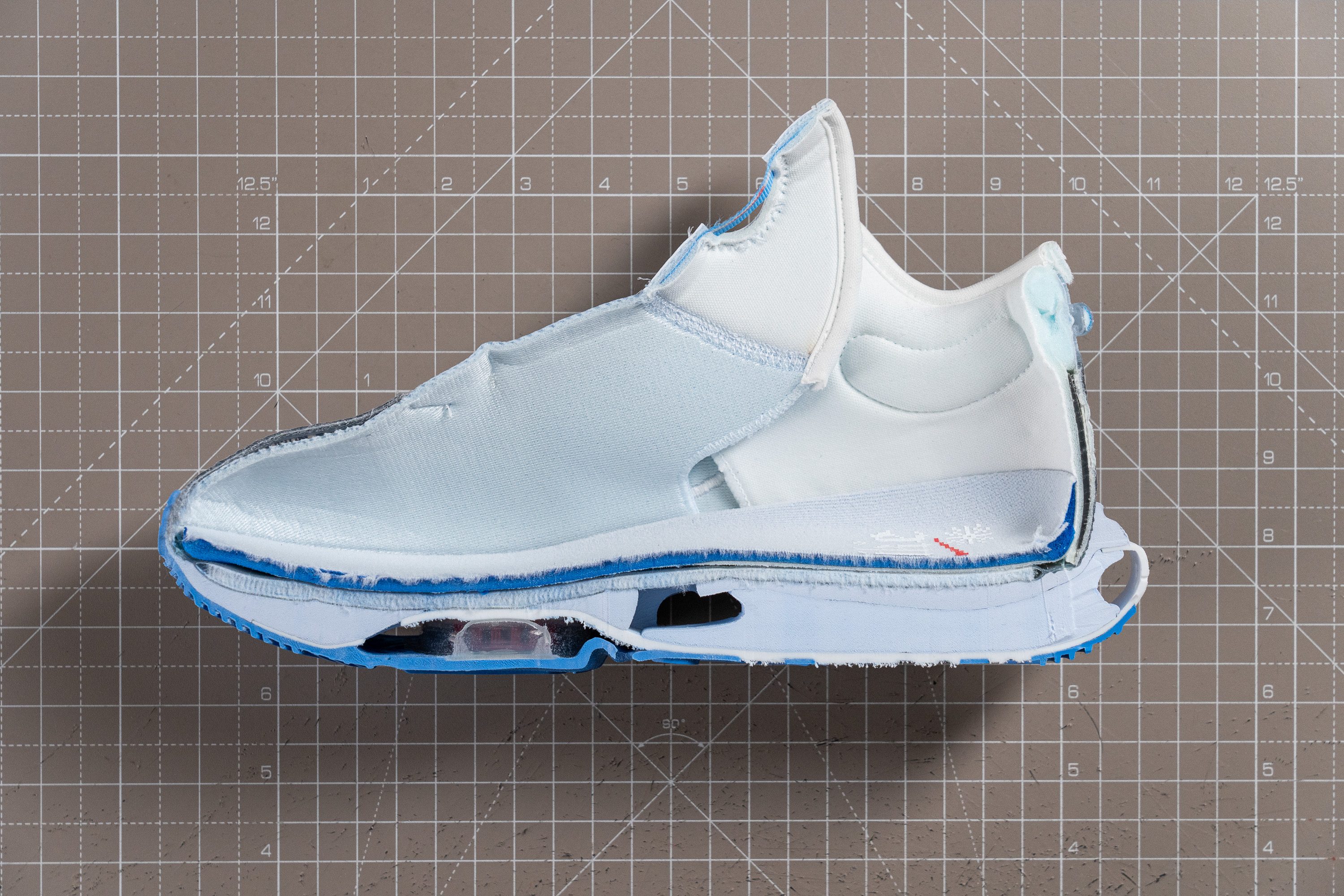
But given the shoe's very dynamic cushioning, the drop felt not as low as the static measurement might suggest.
| G.T. Jump 2 | 6.4 mm |
| Average | 7.4 mm |
Midsole softness
The Nike React foam makes up the biggest portion of the G.T. Jump 2's midsole. We could feel its incredible softness during the playtest.
The fact that it is one of the softest cushioning foams on our roster was also confirmed in our Shore A durometer measurement. The tool showed 16.0 HA which is over 60% plusher than the average!
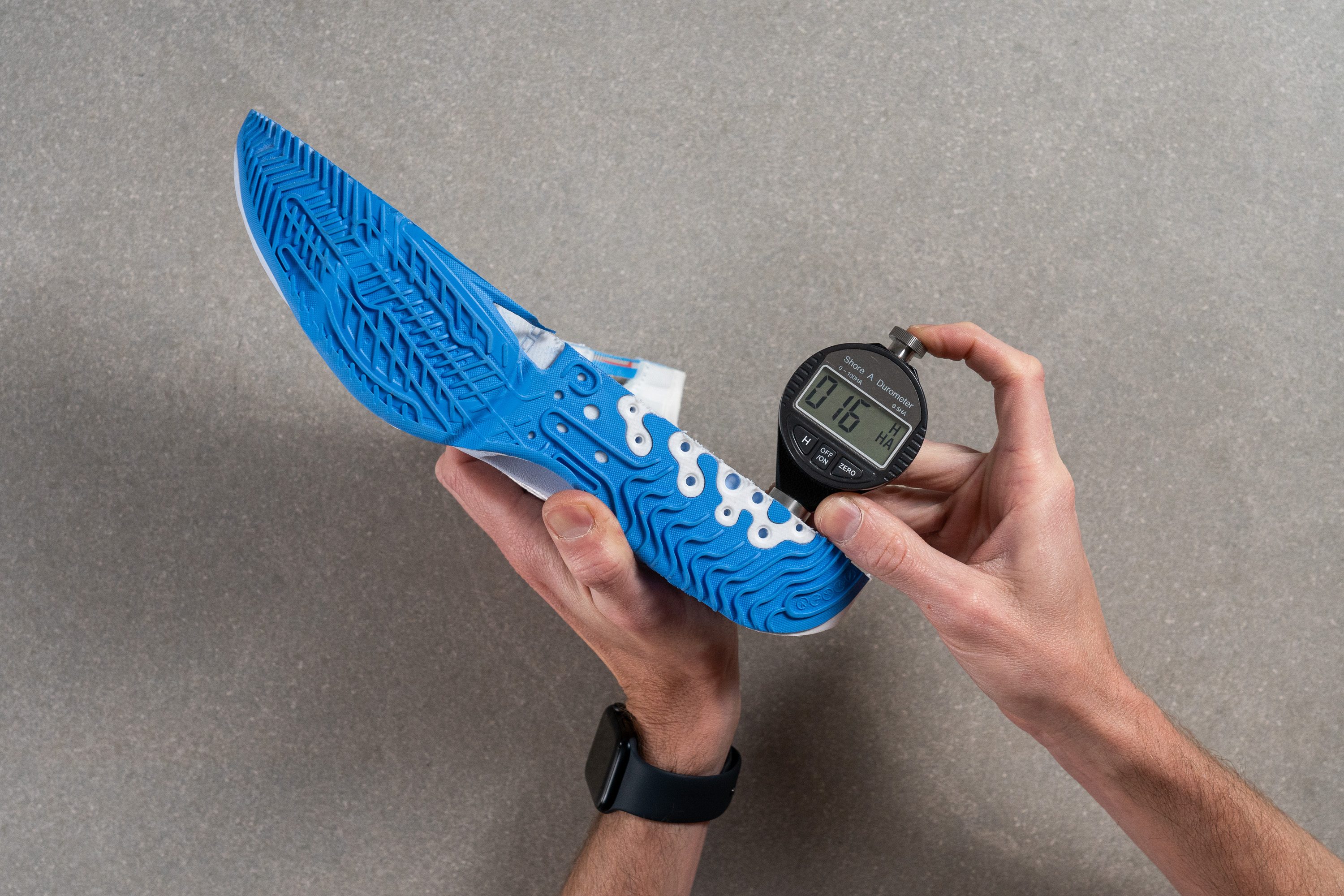
| G.T. Jump 2 | 16.0 HA |
| Average | 24.3 HA |
Secondary foam softness
To prevent the plush cushioning from going out of control, it is encased in a much firmer EVA foam (possibly Phylon?).
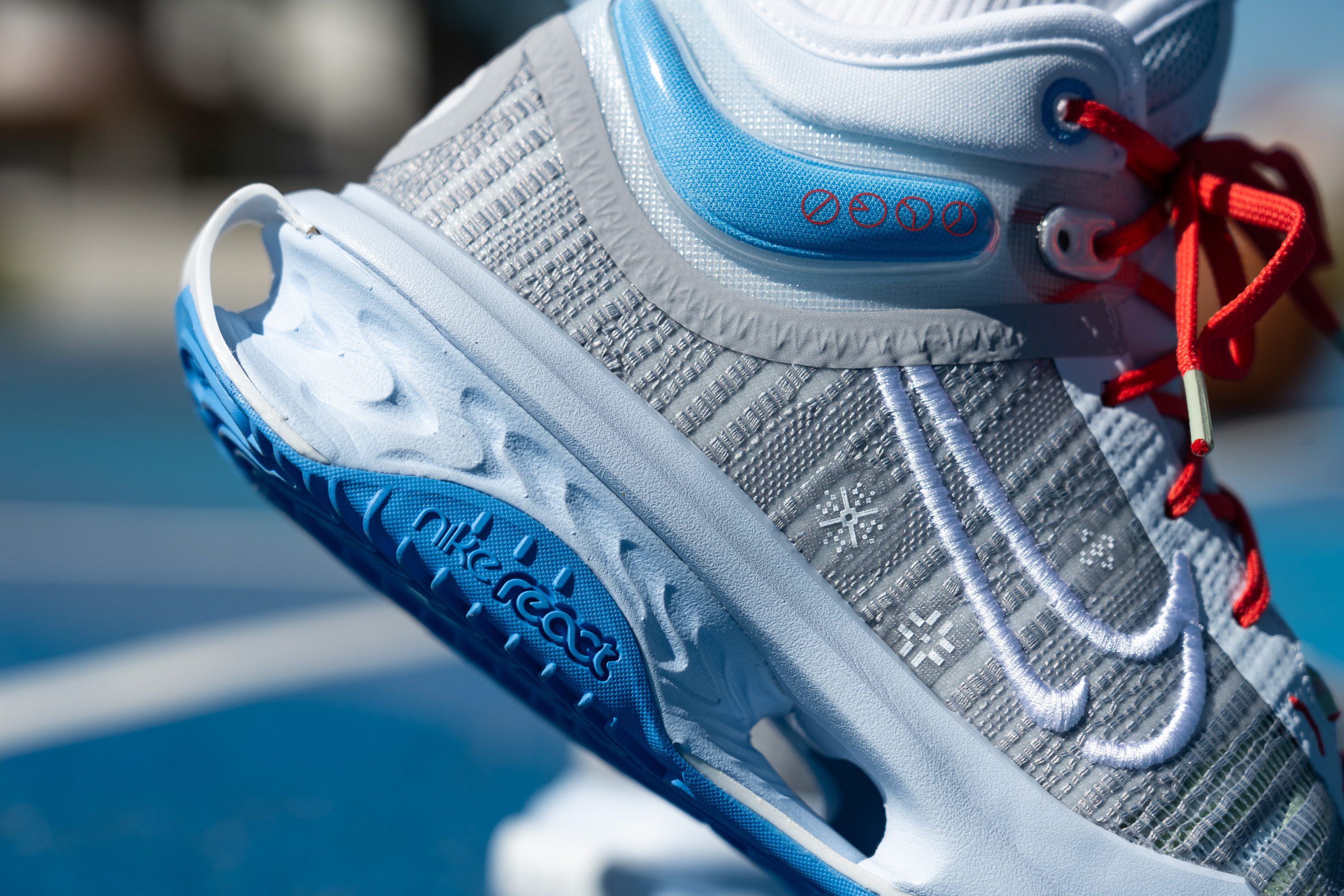
Pressing our durometer against that foam returned a much higher reading of 36.6 HA. That's a whopping 130% firmer than the React foam.
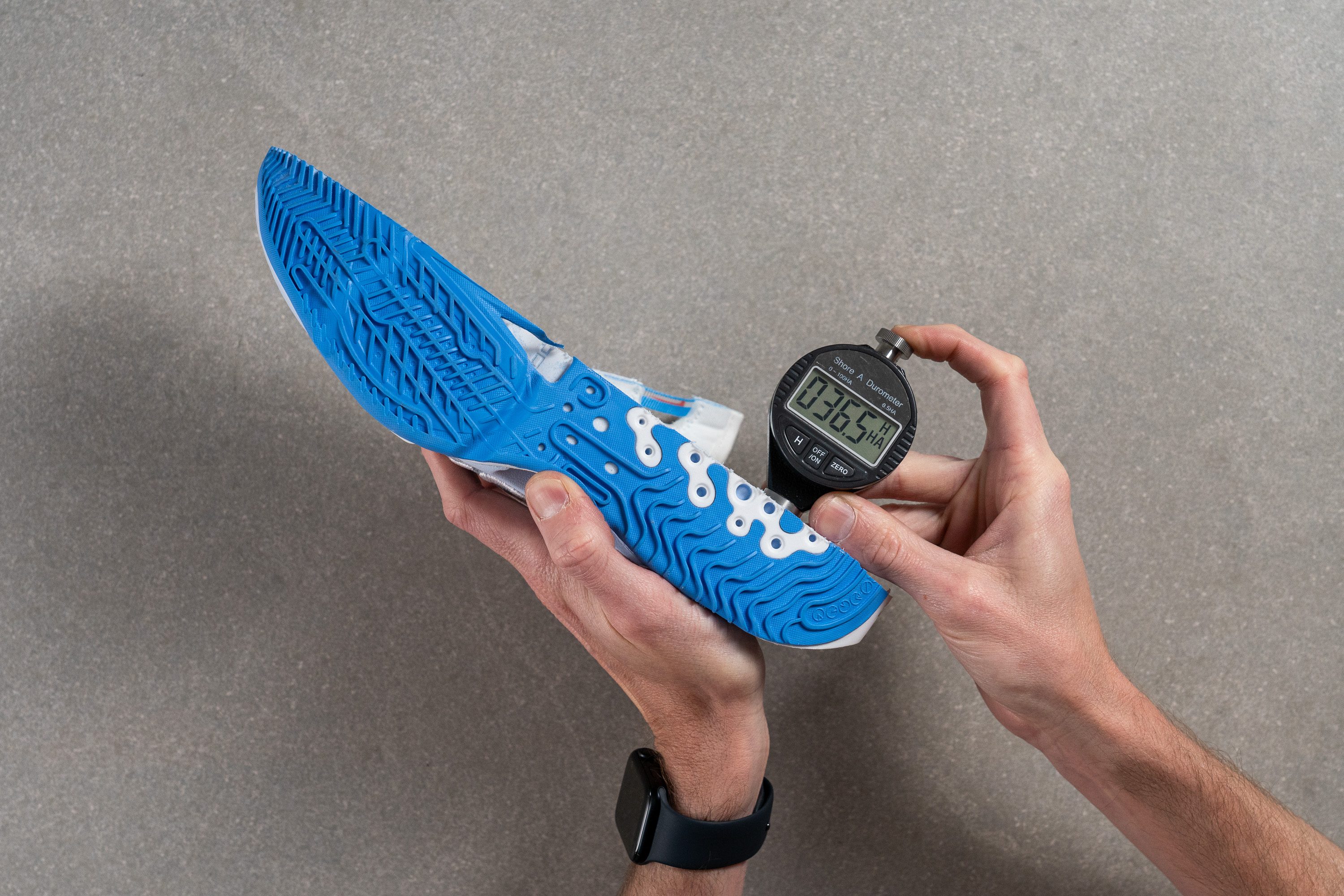
| G.T. Jump 2 | 36.6 HA |
| Average | 27.7 HA |
Size and fit
Size
Nike G.T. Jump 2 fits true to size (170 votes).
Internal length
| G.T. Jump 2 | 272.5 mm |
| Average | 271.7 mm |
Width / Fit
We found the G.T. Jump 2 to be perfectly fitting in our regular D medium width.
Measuring the replica of its interiors with a caliper, we got 92.6 mm in the widest area. This is on par with the average of basketball shoes in the same size and width.
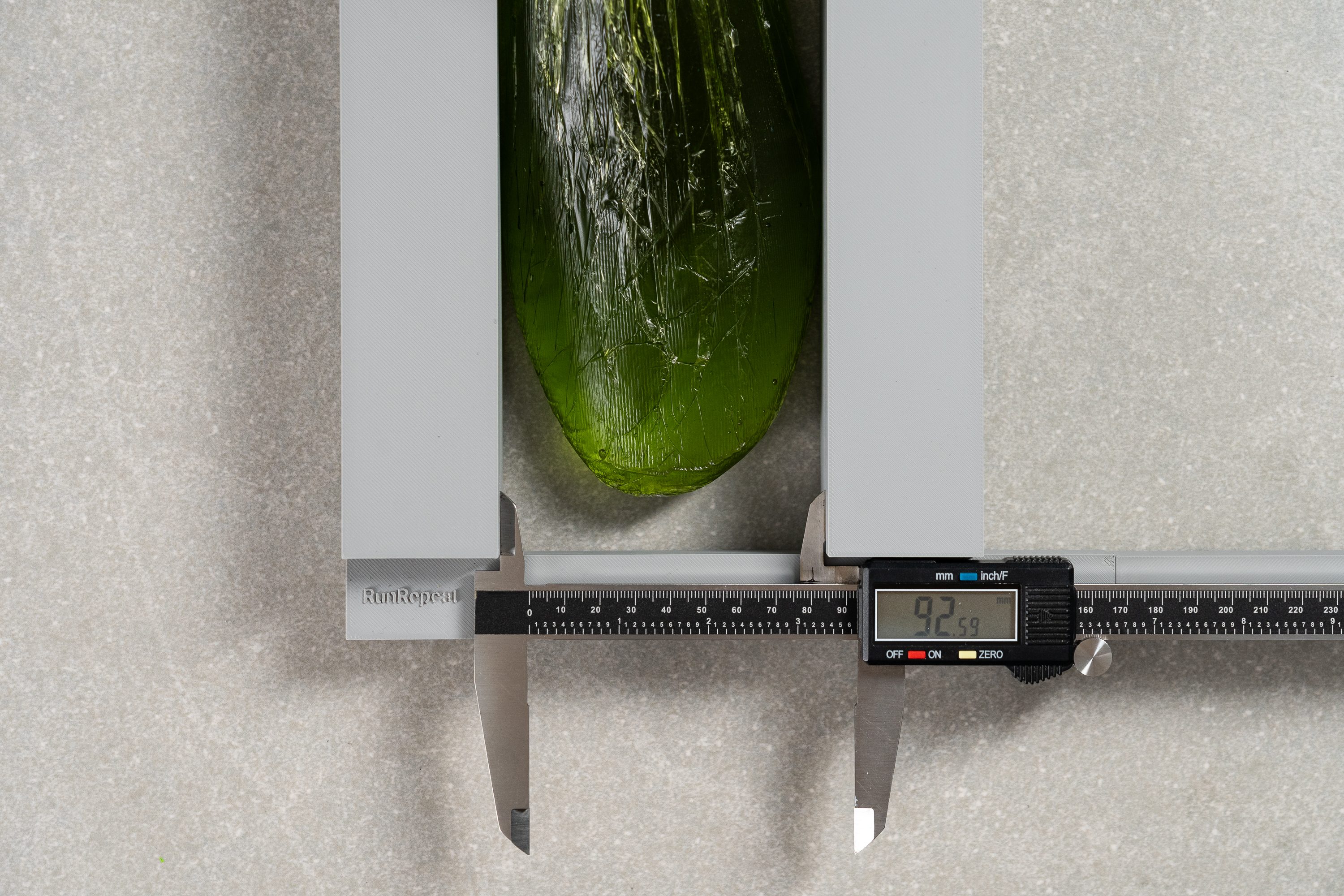
| G.T. Jump 2 | 92.6 mm |
| Average | 92.8 mm |
Toebox width
We were also delighted to find that the shoe doesn't taper too aggressively toward the toes.
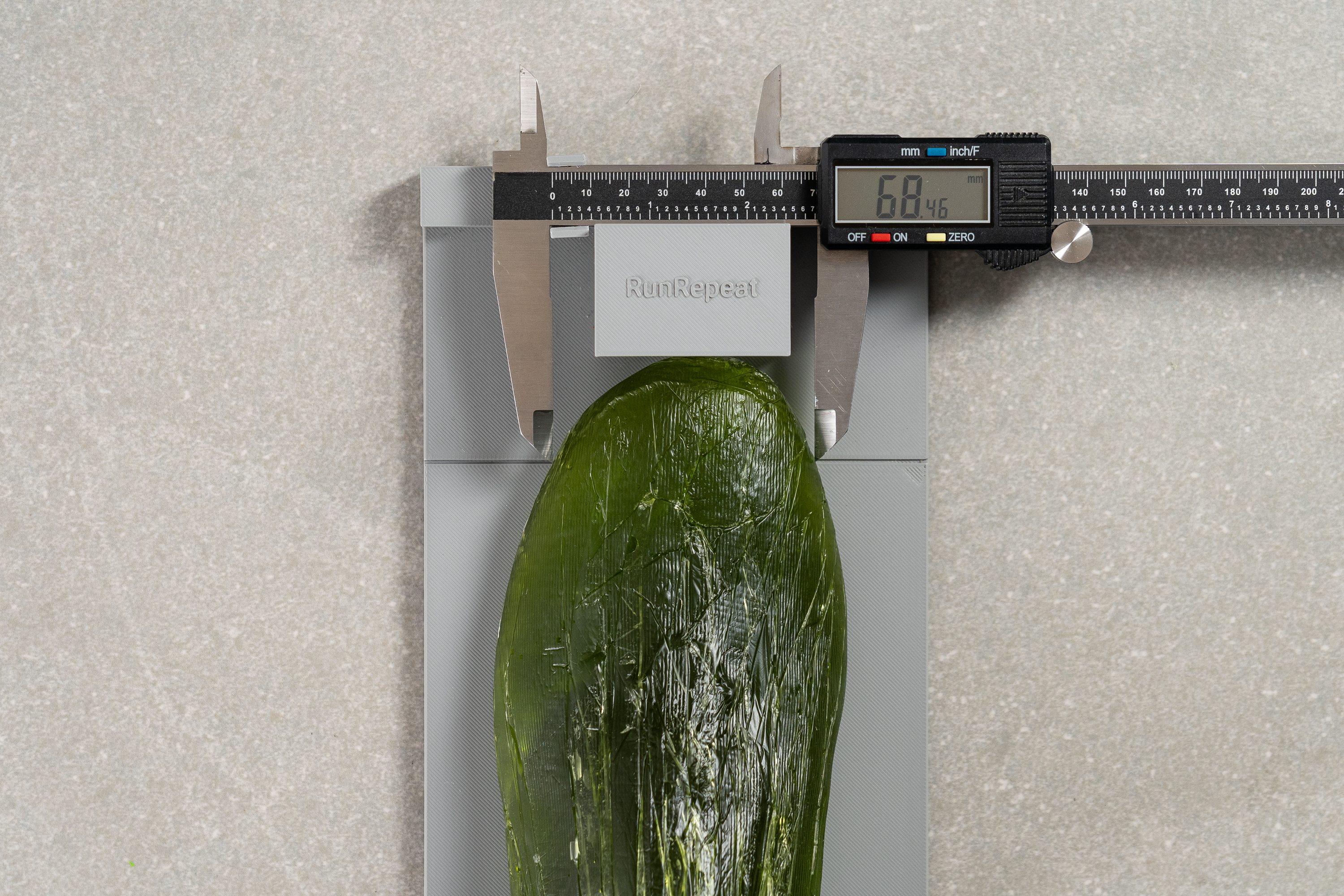
Our second caliper measurement showed another standard width of 68.4 mm in the big toe area.
We had just one concern about the G.T. Jump 2's upper - is its fabric going to stretch out with use? Fortunately, it won't.
Aside from offering fantastic breathability, the shoe's Leno weave is also highly resistant to stretching which is essential for the shoe's long-term support.
| G.T. Jump 2 | 68.4 mm |
| Average | 69.3 mm |
Toebox height
The shoe's toebox height turned out to be a little lower than average at 22.6 mm but it's nothing to worry about.
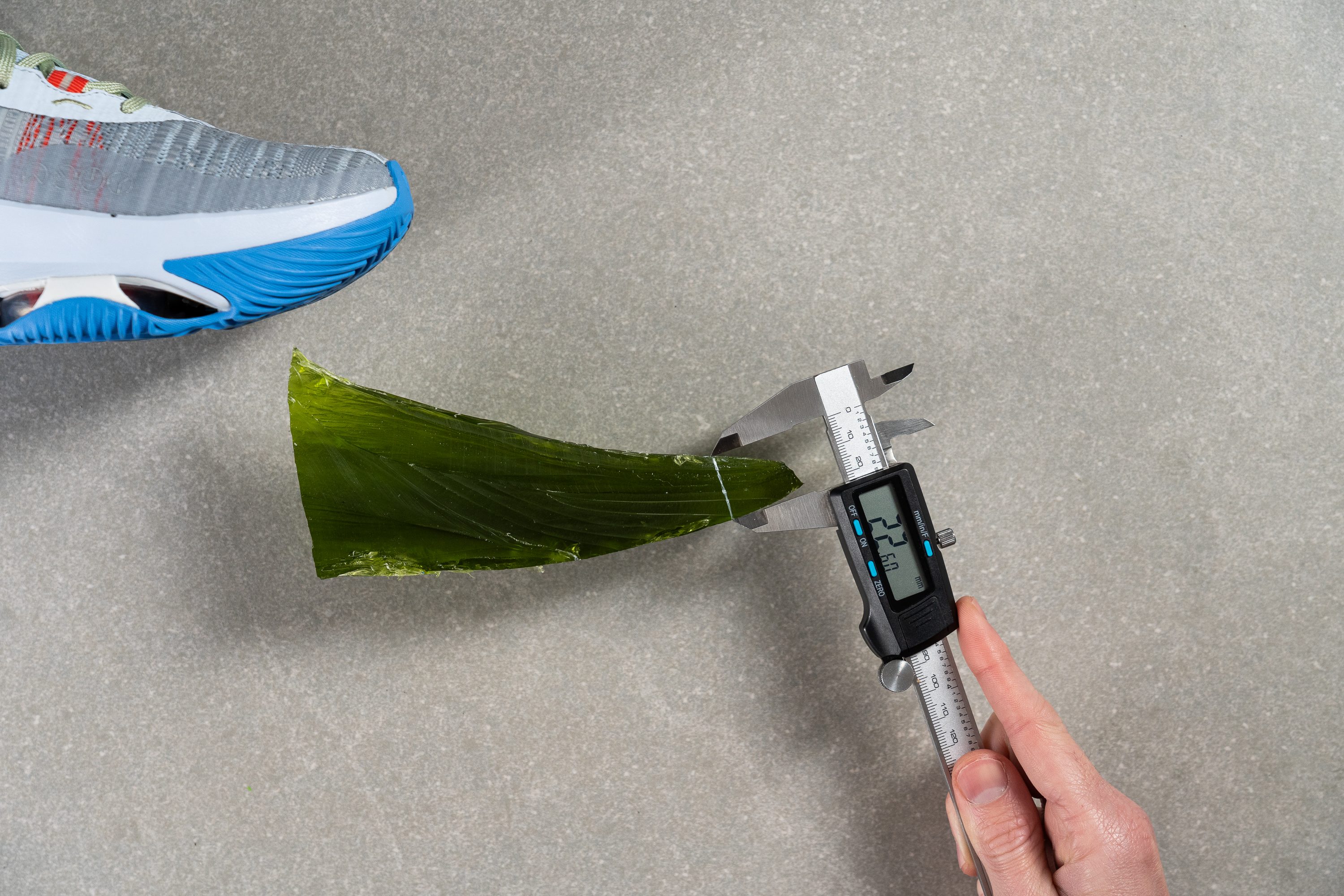
| G.T. Jump 2 | 22.6 mm |
| Average | 23.5 mm |
Traction / Grip
Forefoot traction
We found the G.T. Jump 2's traction to be average compared to other high-performing shoes from Nike and other brands. Its moderate friction coefficient of 0.67 offers just enough bite to keep you surefooted but it doesn't guarantee the hardest stops.
| G.T. Jump 2 | 0.67 |
| Average | 0.75 |
Outsole design
The Nike G.T. Jump 2 features a visually striking outsole design that makes it look very carefully engineered. However, we couldn't find any additional benefits as it offers only decent performance on hardwood and is not sturdy enough for the blacktop.
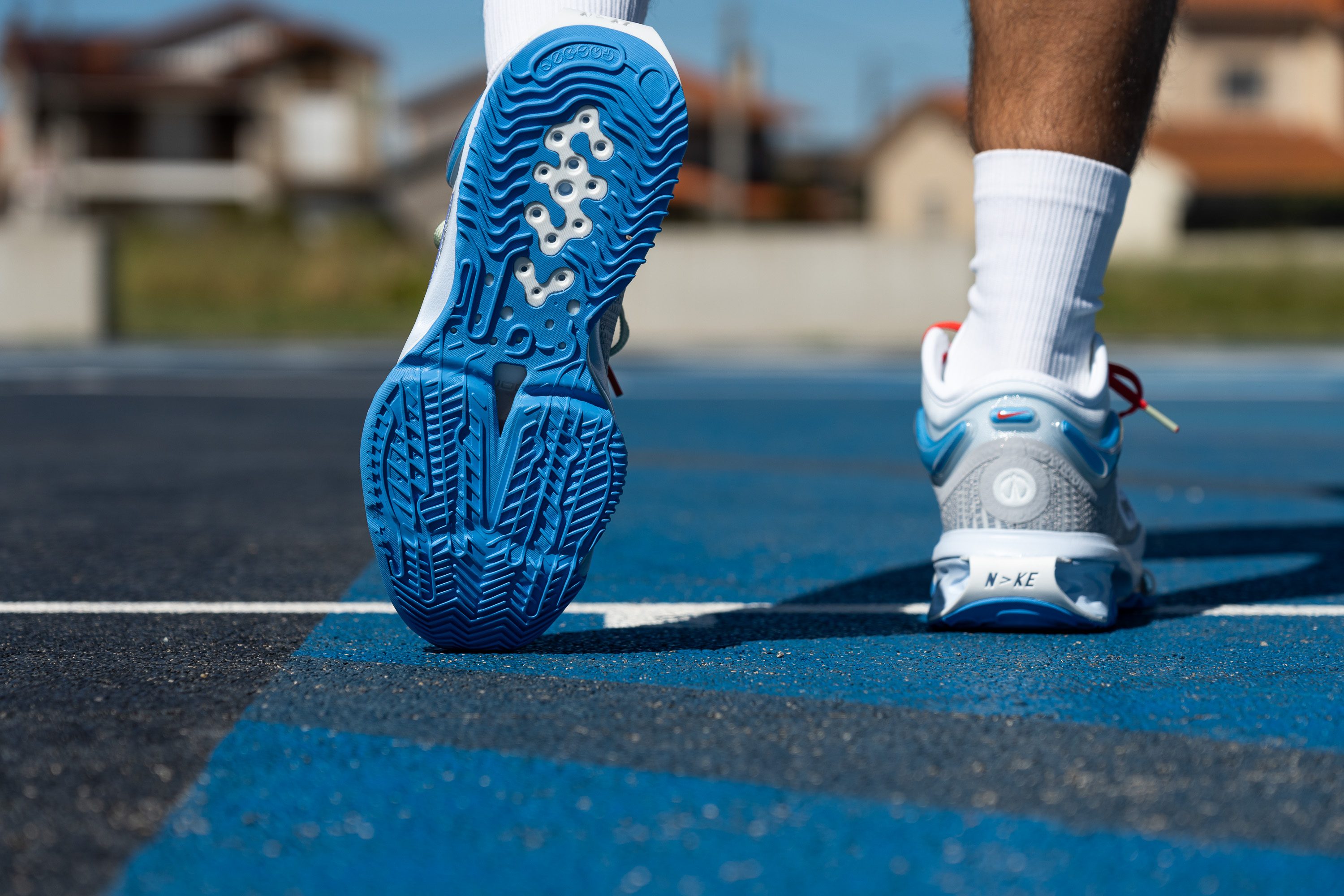
Flexibility / Stiffness
With the shoe's large Zoom Air units in the forefoot, flexibility is not to be expected in the G.T. Jump 2. But don't worry, this Nike shoe is only moderately stiffer than the average hoop shoe.
Measuring how much force it takes to bend it, our flexing tester showed 23.5N. This is very close to the reading we got in other Nike shoes like the LeBron 22 (23.3N).
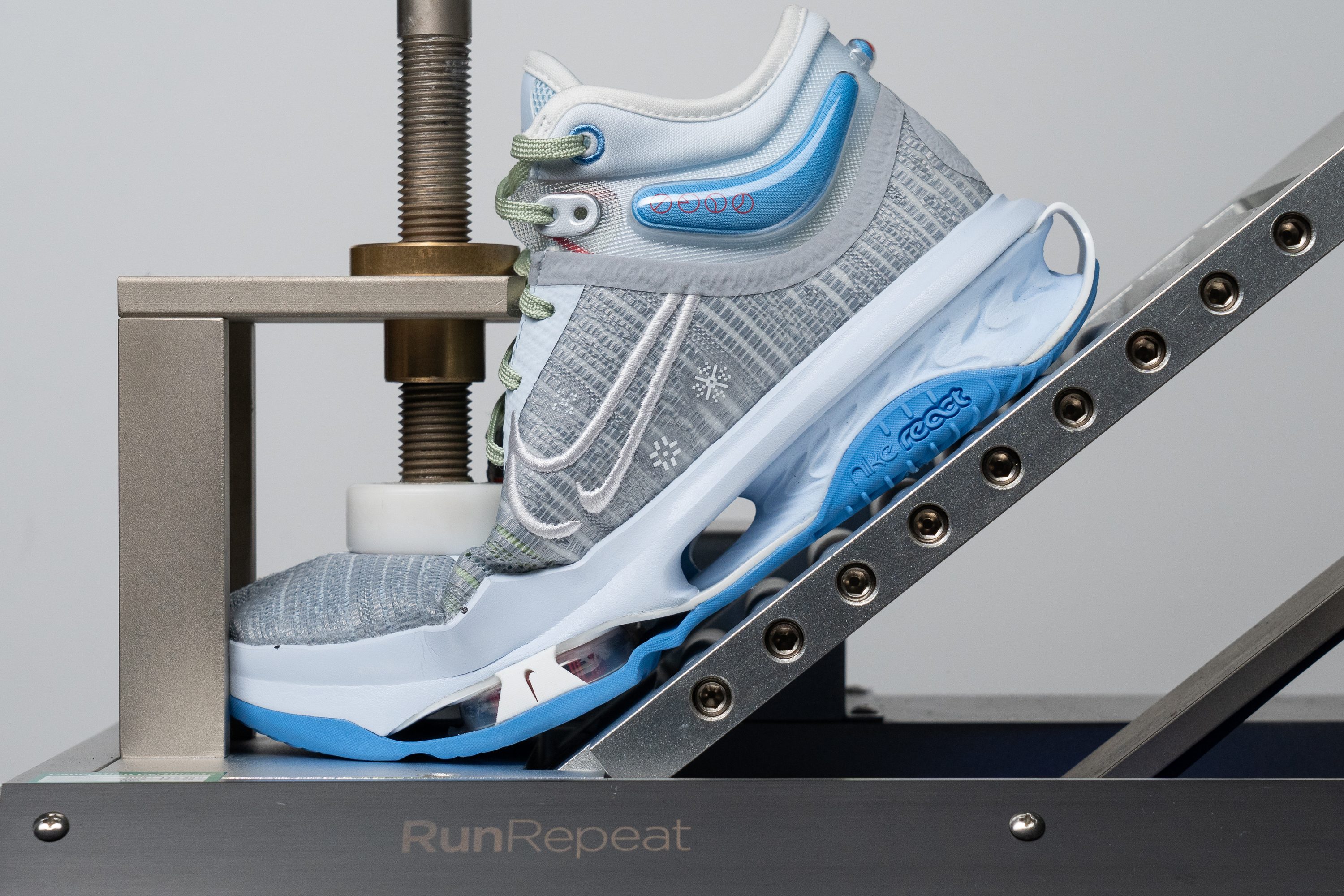
| G.T. Jump 2 | 23.5N |
| Average | 20.5N |
Weight
There is so much to the G.T. Jump 2's midsole, it could not help but affect its weight.
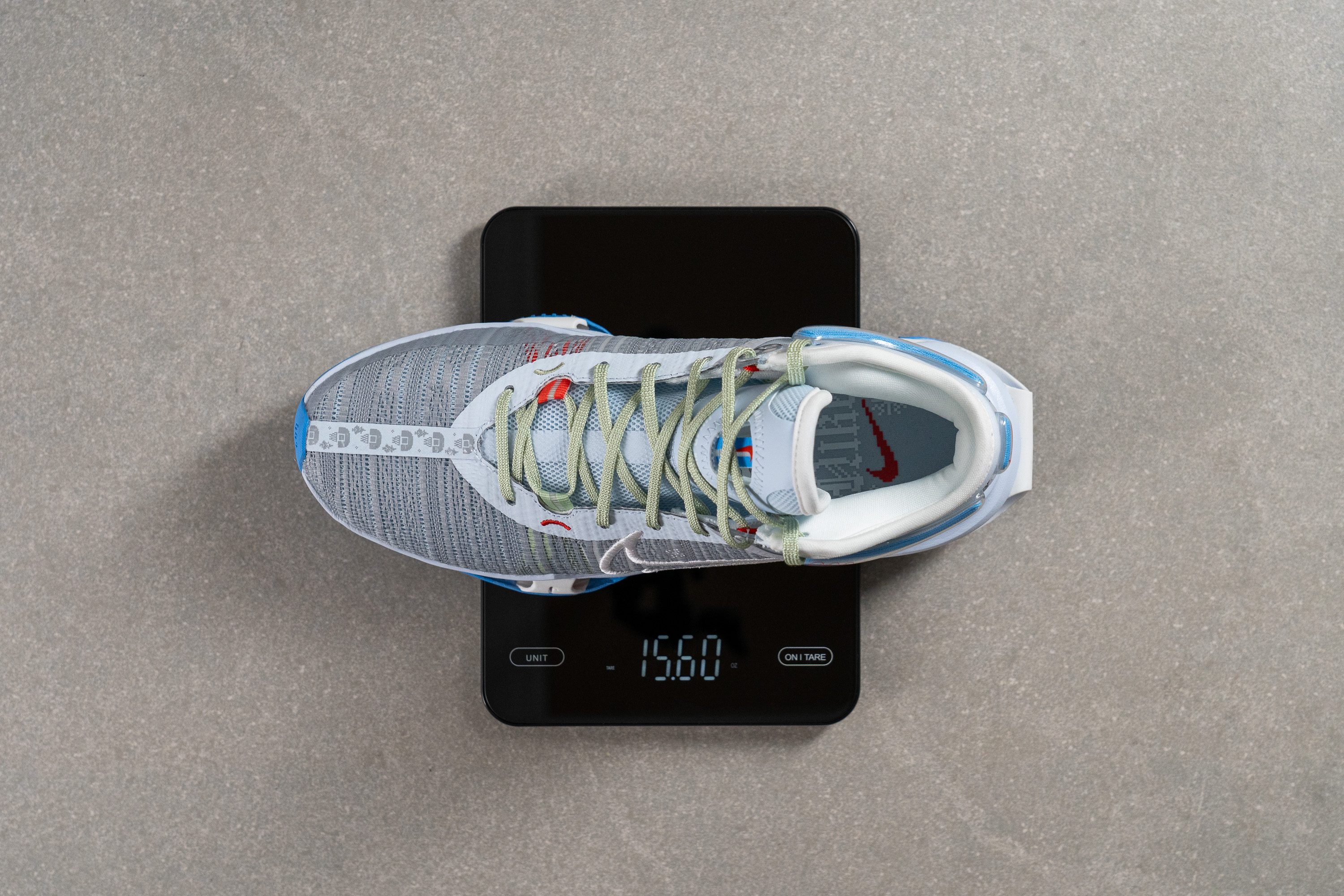
Putting the shoe on the scale in a men's US size 9, we got 15.6 oz (442g). That is more than an ounce heavier than average.
But we are convinced that bigger players (the shoe's target audience) won't find it as heavy.
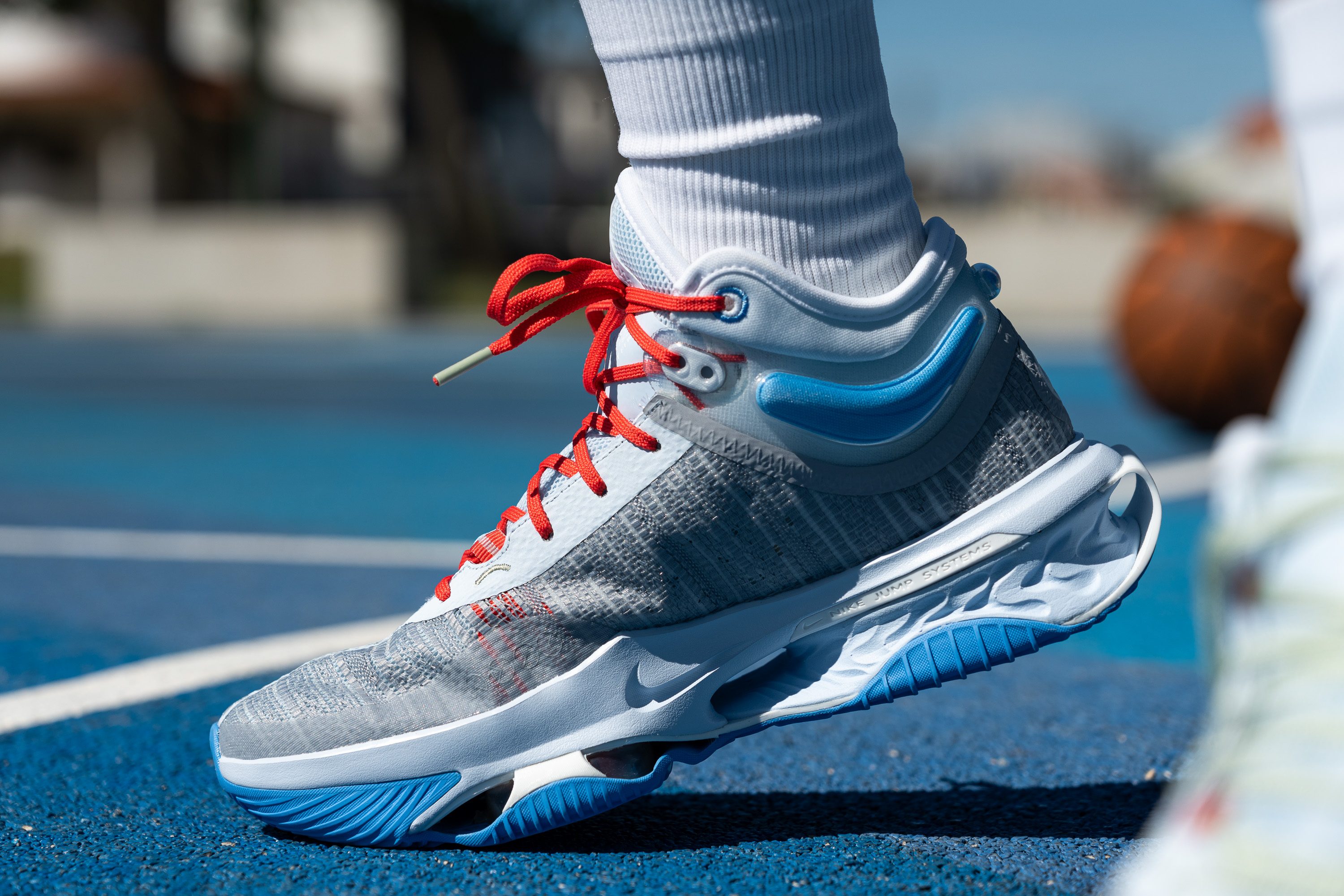
It's the nimble guards who are used to more grounded footwear may find the G.T. Jump 2 somewhat bottom-heavy.
| G.T. Jump 2 | 15.6 oz (442g) |
| Average | 13.8 oz (391g) |
Breathability
Breathability is rarely a priority for basketball shoes. But the G.T. Jump 2 is here to offer a breath of fresh air!
In our proprietary ventilation test, this Nike shoe eagerly expelled all the smoke we pumped into it. Its entire upper took part in the airflow demonstrating a higher-than-average level of breathability.
Just take a look at how incredibly thin and transparent the shoe's upper material is! We didn't hesitate to give the G.T. Jump 2 a high breathability score of 4 out of 5.
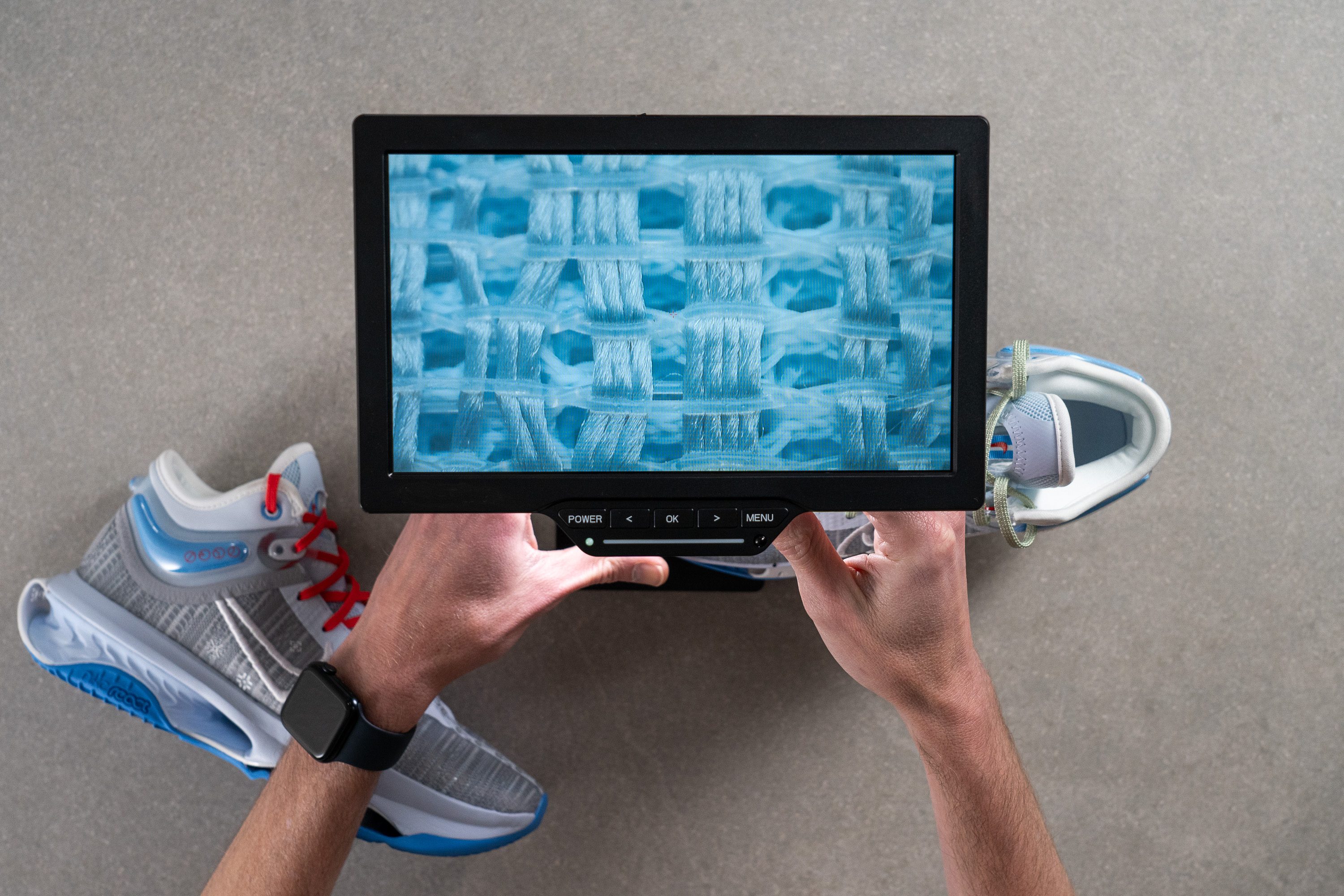
If you feel like you've seen this type of material before, try thinking of a potato bag. Yes, it is the same kind of Leno mesh! Its open construction allows for fantastic ventilation without losing strength.
| G.T. Jump 2 | 4 |
| Average | 2.5 |
Stability
Lateral stability test
Overall, the Nike G.T. Jump 2 has a pretty stable construction thanks to elements like:
- a stiff jump plate
- a firm carrier foam with extended sidewalls
- a wide base with a lateral outrigger in the forefoot
- webbing loops that connect the laces to the base of the shoe
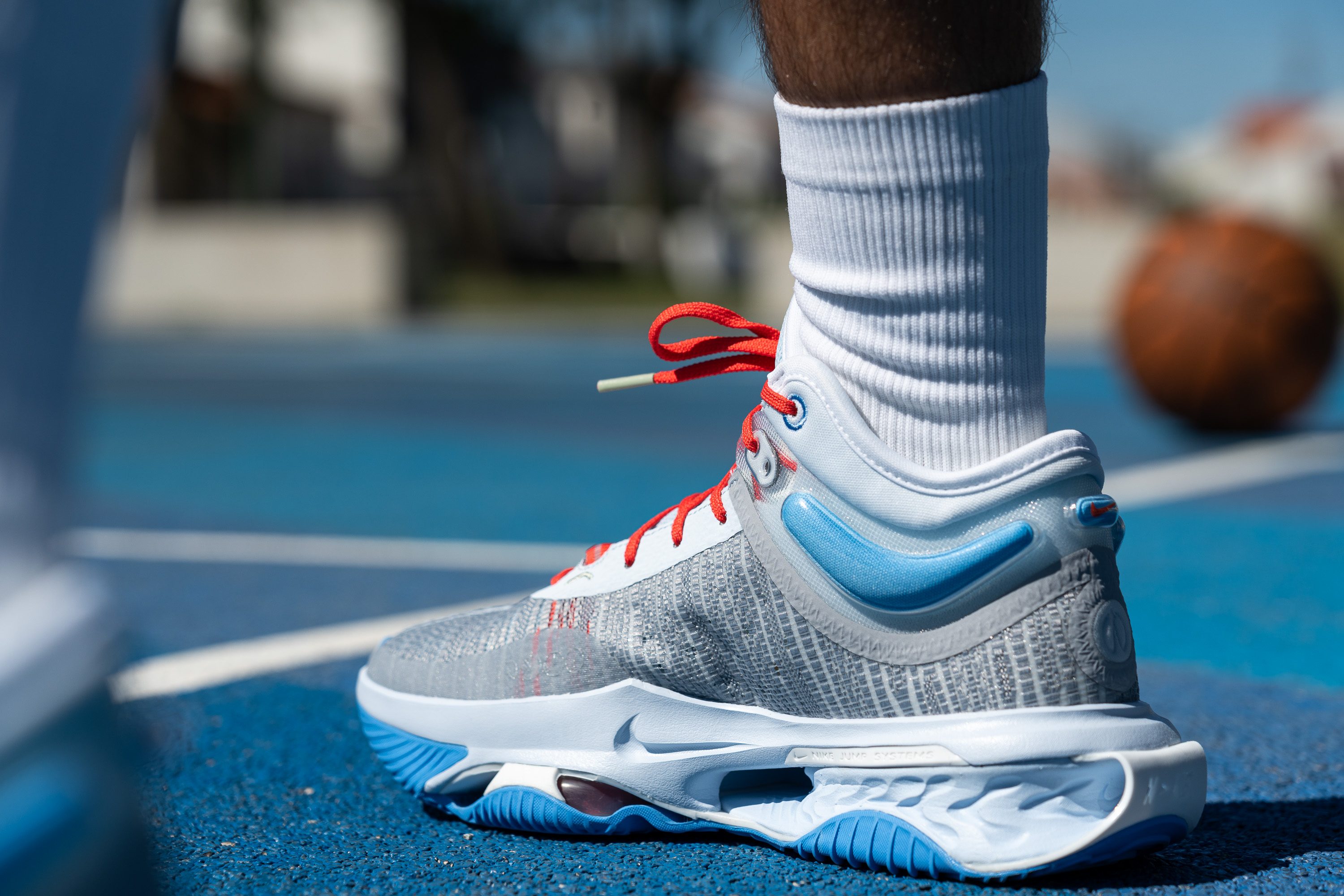
The only factor that detracted from the shoe's overall stability was its high platform.
The substantial midsole kept our feet pretty high off the ground which got our ankles working a bit more than usual to steady the footing.
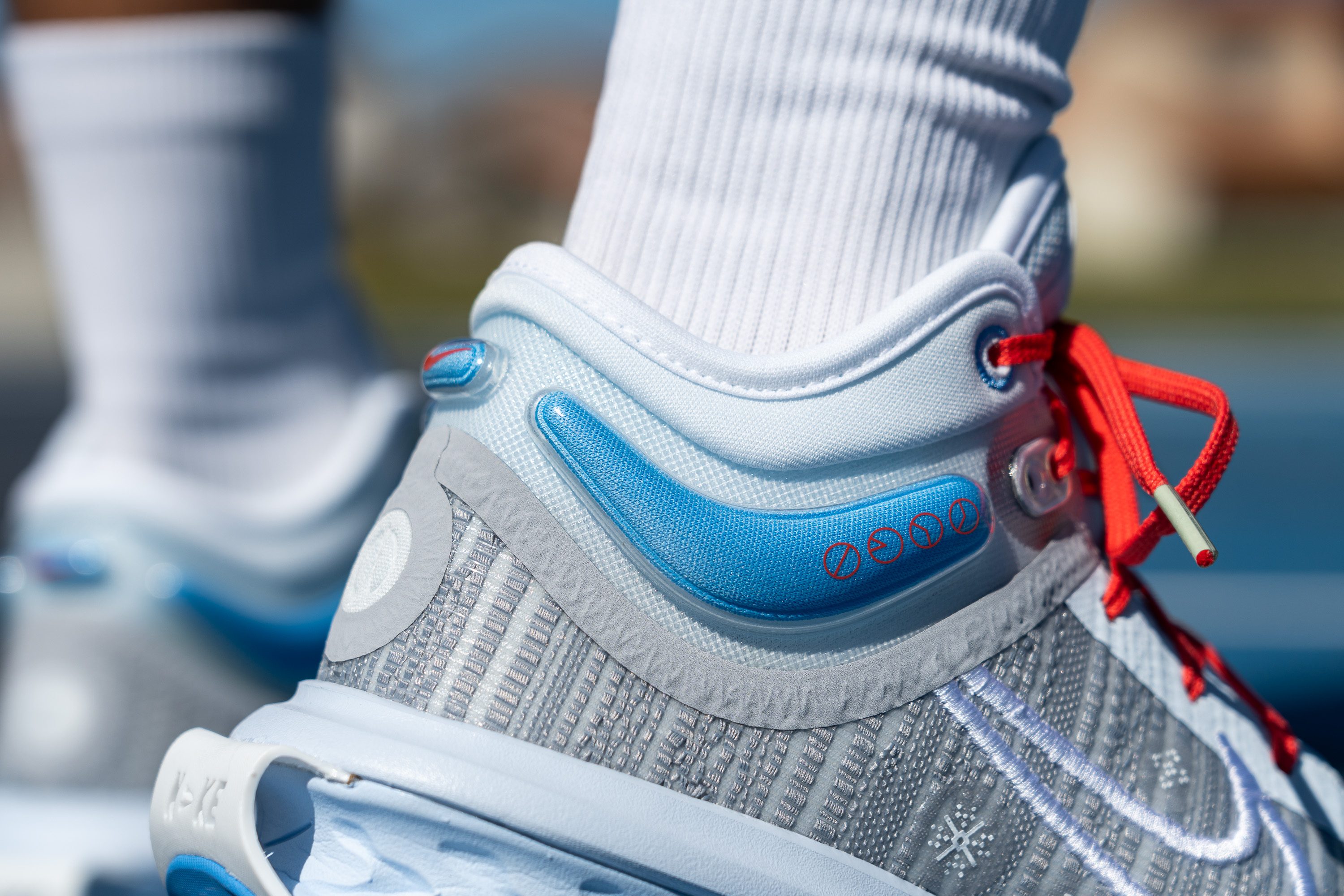
Don't get us wrong, it's not a wobbly basketball shoe per se but if you are used to relying on strong ankle support, you may find it missing in the G.T. Jump 2. Consider the Jordan XXXVIII instead.
Torsional rigidity
Don't be tricked by its soft cushioning - the G.T. Jump 2 has plenty of stiffness to make it a very stable shoe.
When we attempted to twist the G.T. Jump 2 in our manual test, it simply refused to give in! All of its stabilizing components came into play forcing the shoe to protect the status quo.
Having tested dozens of basketball shoes, we can confidently state that this is one of the most rigid ones out there. Thus, ts torsional rigidity got the highest score - 5 out of 5.
Rolling your ankles will not be as easy in this one as it might seem.
| G.T. Jump 2 | 5 |
| Average | 4.5 |
Heel counter stiffness
We also found that the G.T. Jump 2 has a rather strong heel hold.
Giving it a good push and squeeze revealed how much rigidity the heel counter actually holds. On a 1-5 stiffness scale, we gave it a solid 4 out of 5.
We never felt as though our heels were getting out of control thanks to this firm and secure rearfoot design.
| G.T. Jump 2 | 4 |
| Average | 3.8 |
Midsole width - forefoot
A nice and wide platform is another major contributor to the G.T. Jump 2's stability.
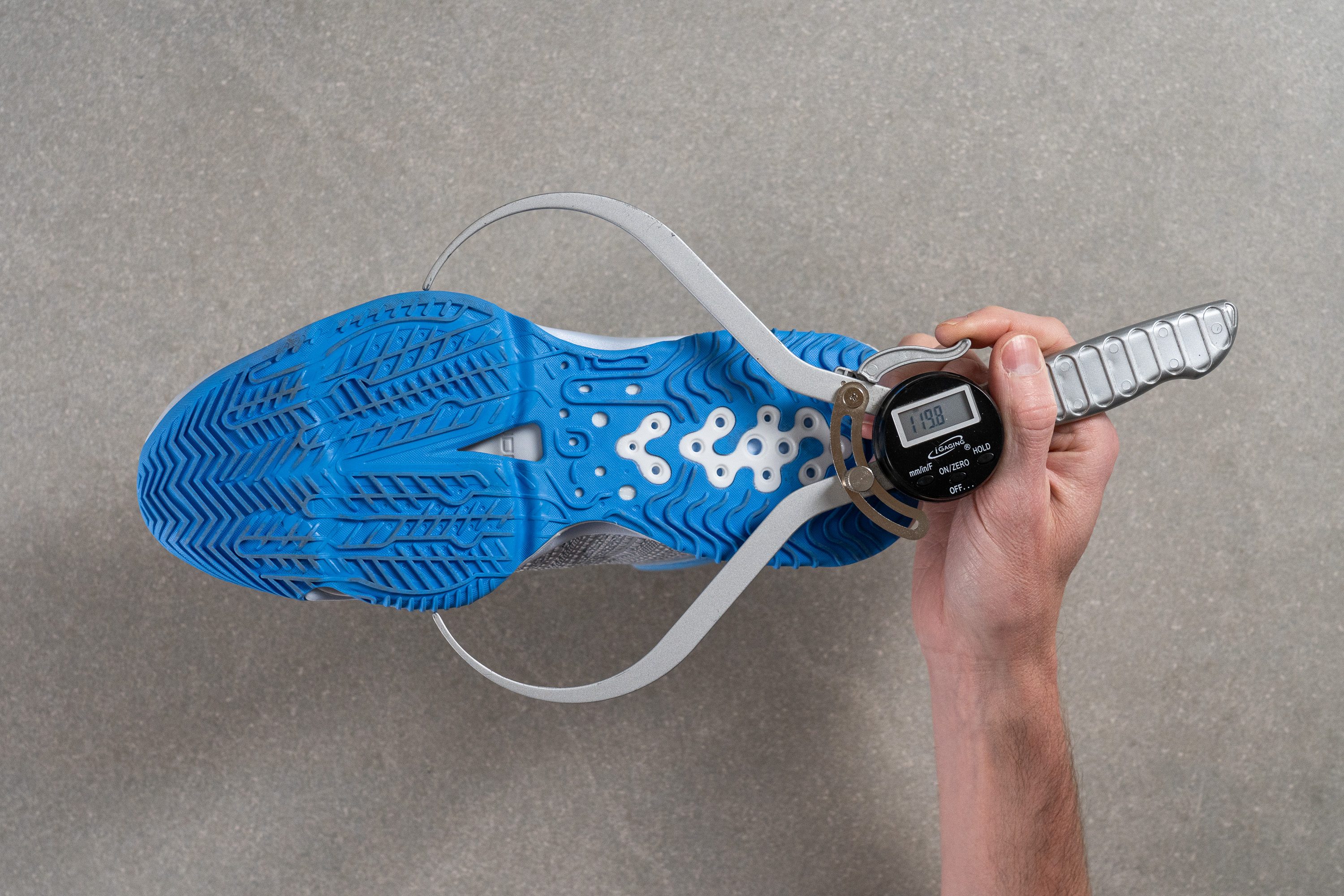
Measuring the widest area of the shoe's forefoot with a caliper, we got 119.8 mm. This is even a few millimeters wider than average!
This is all thanks to the outrigger on the lateral side of the sole which comes in handy during sharp turns and cuts.
| G.T. Jump 2 | 119.8 mm |
| Average | 114.8 mm |
Midsole width - heel
A broad heel also helped us stabilize the ride in the most critical moments of the playtest.
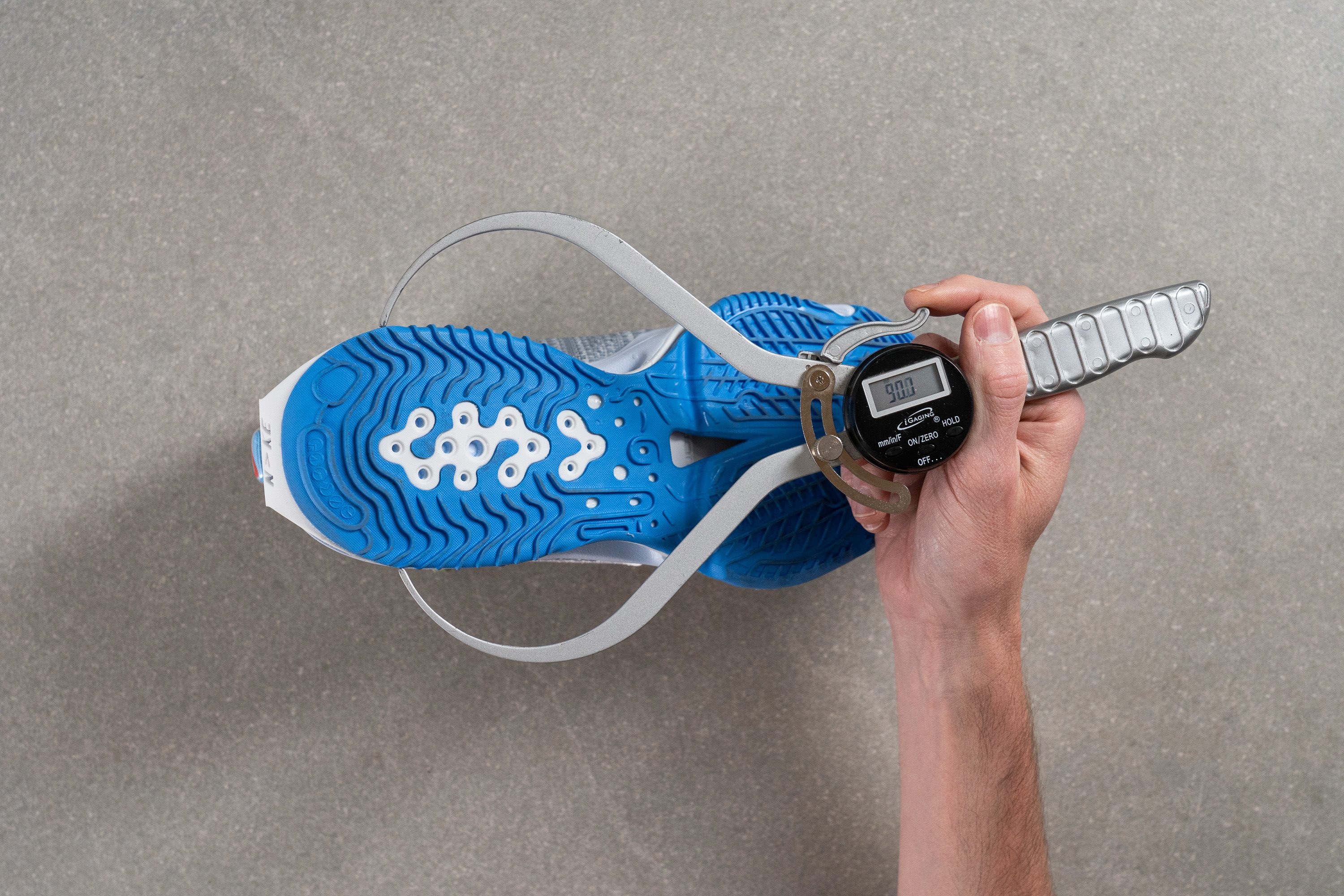
Even though it is just the same as the average at 90.1 mm, the shoe's heel helped us feel planted landing on our heels.
| G.T. Jump 2 | 90.1 mm |
| Average | 89.7 mm |
Durability
Toebox durability
The downside to this airy fabric is its obvious lack of wear resistance compared to other basketball shoe uppers.
But Nike thoughtfully added protective overlays on the high-wear areas to enhance durability.
We tested the strength of the fabric string on the toebox with a Dremel at the speed of 5K RPM. It turned out to be quite sturdy, earning the shoe's toebox a high durability score of 4 out of 5.
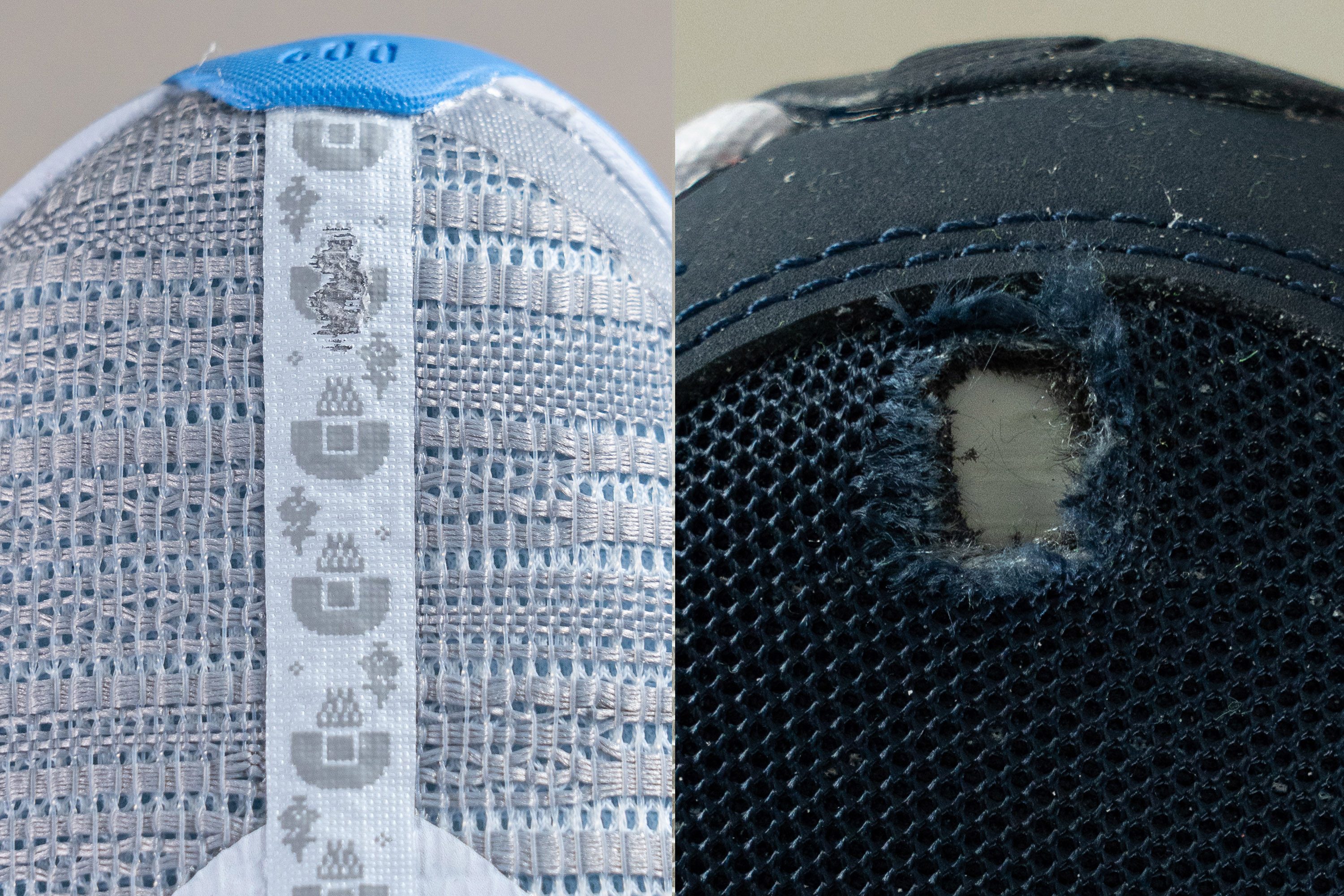
| G.T. Jump 2 | 4 |
| Average | 3.7 |
Heel padding durability
The nylon fabric inside the G.T. Jump 2 also proved to be immune to abrasion.
Applying the sandpaper tip of our Dremel to it for 4 seconds resulted in a barely visible scratch.
Compared to the glaring holes we saw on other shoes after the same test, this Nike shoe deserves a high score for heel padding durability - 4 out of 5!
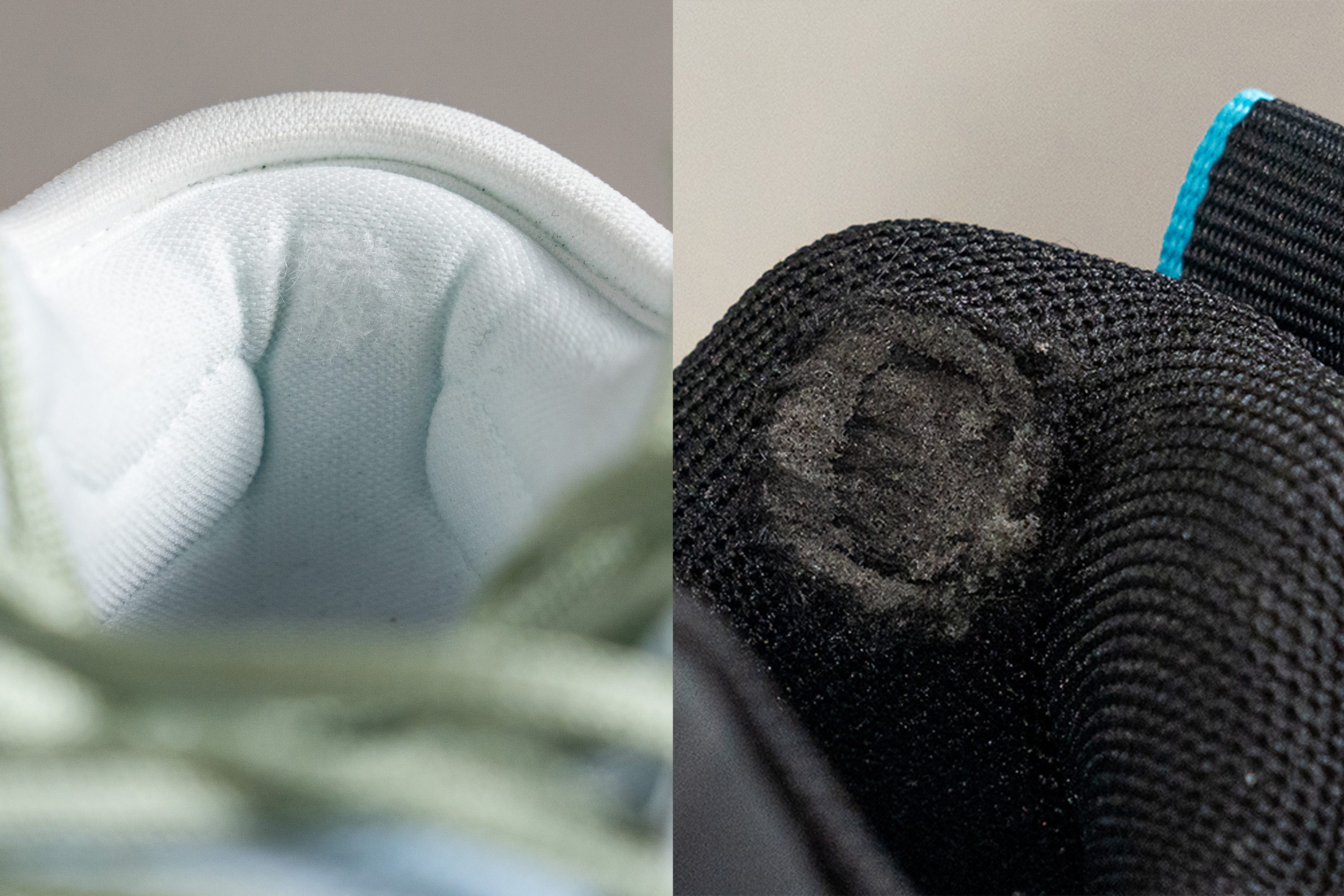
| G.T. Jump 2 | 4 |
| Average | 3.7 |
Outsole hardness
The G.T. Jump 2 features a pretty hard rubber for the outsole. Pressing our Shore C durometer against it returned a higher-than-average reading of 87.6 HC.
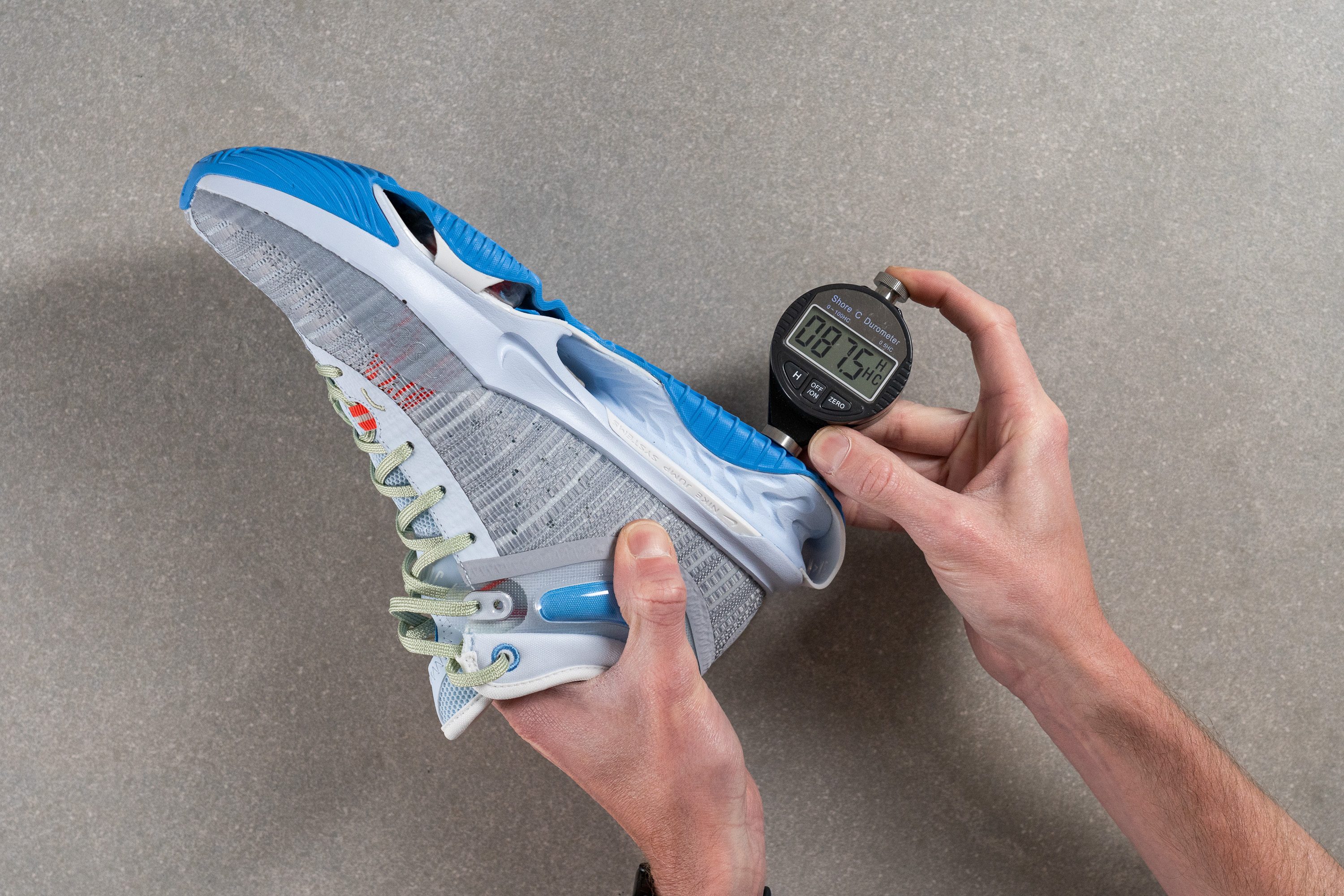
Nike calls it "XDR" for "Extra Durable Rubber." But let's return to our Dremel to check if that's really true.
| G.T. Jump 2 | 87.6 HC |
| Average | 81.5 HC |
Outsole durability
After drilling the shoe's outsole for 22 seconds at a higher speed of 10K RPM, we felt like the word "Extra" should be dropped from the rubber's name.
Its thin undulating lugs didn't do as well as some of the other traction patterns we've tested.
According to our tread gauge, the depth of the damage on the G.T. Jump 2 reached 1.9 mm which is notably deeper than average.
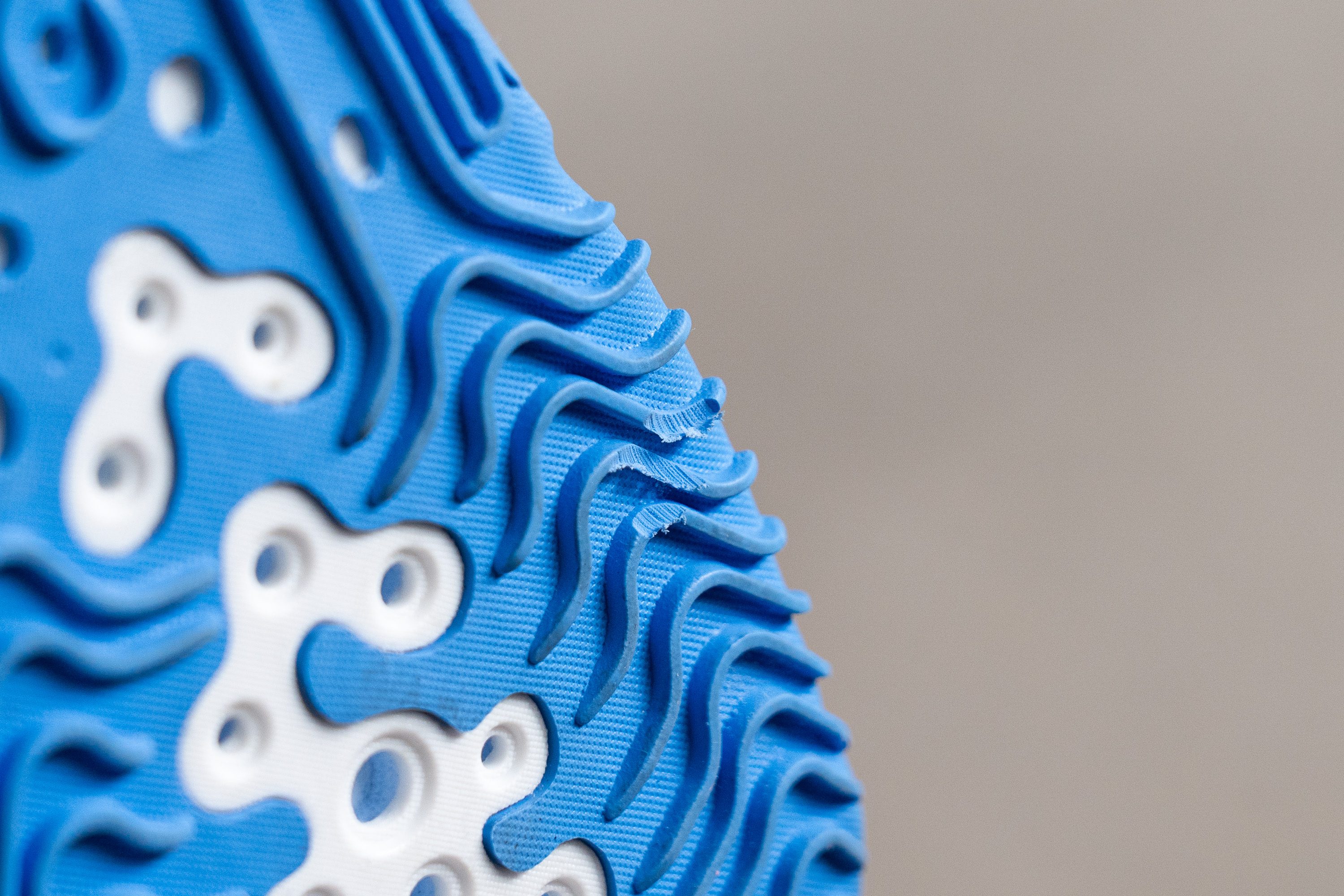
| G.T. Jump 2 | 1.9 mm |
| Average | 1.0 mm |
Outsole thickness
Good thing Nike packed more rubber to prolong the outsole's shelf life. Our caliper measured 5.8 mm which is thicker than average.
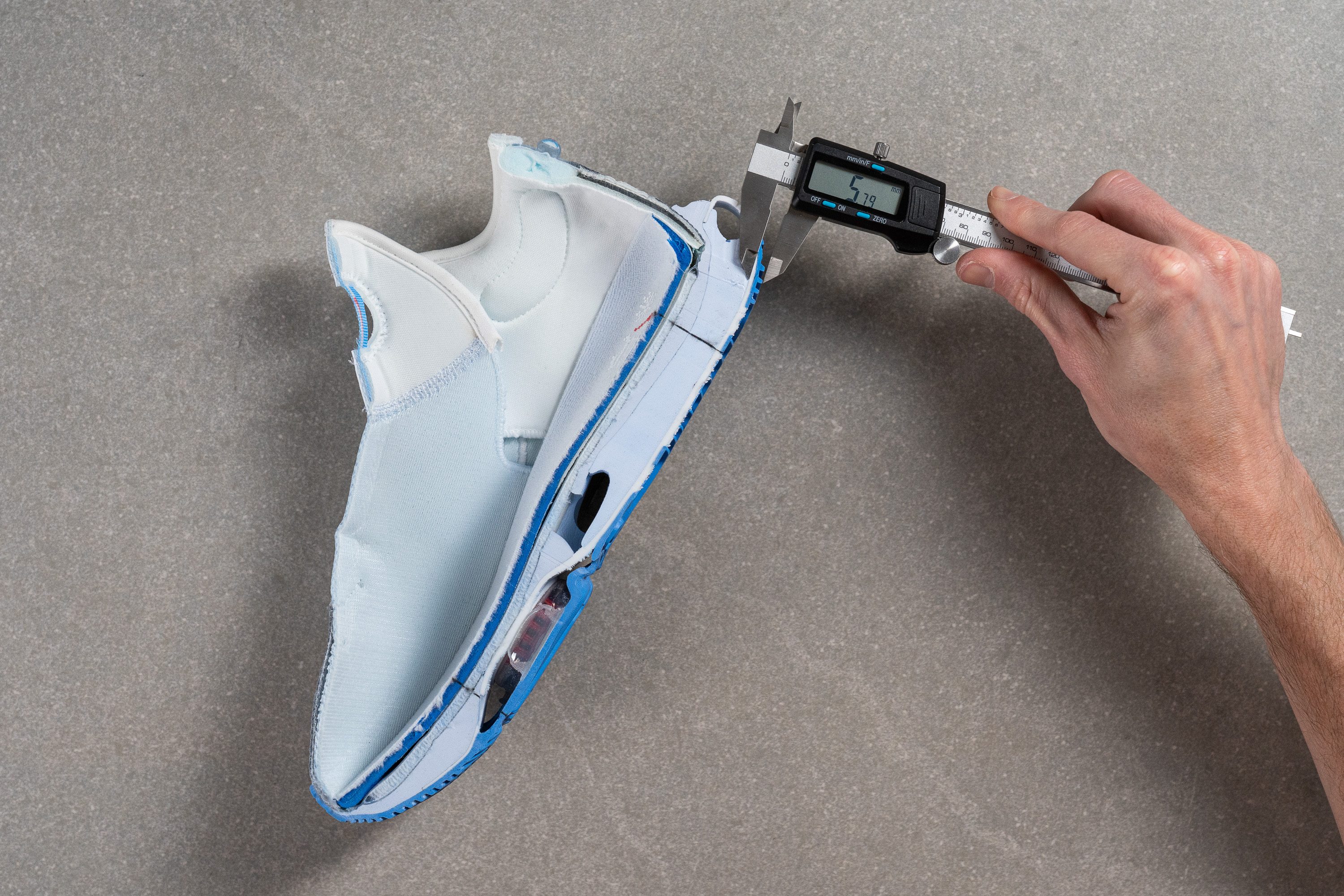
But considering how easily damaged the lugs are, we suspect that the shoe will lose its grip sooner.
That's why we can't recommend using the G.T. Jump 2 on concrete outdoor courts.
| G.T. Jump 2 | 5.8 mm |
| Average | 4.0 mm |
Misc
Insole thickness
Like all that midsole cushioning wasn't enough, the G.T. Jump 2 also features a thicker-than-average insole!
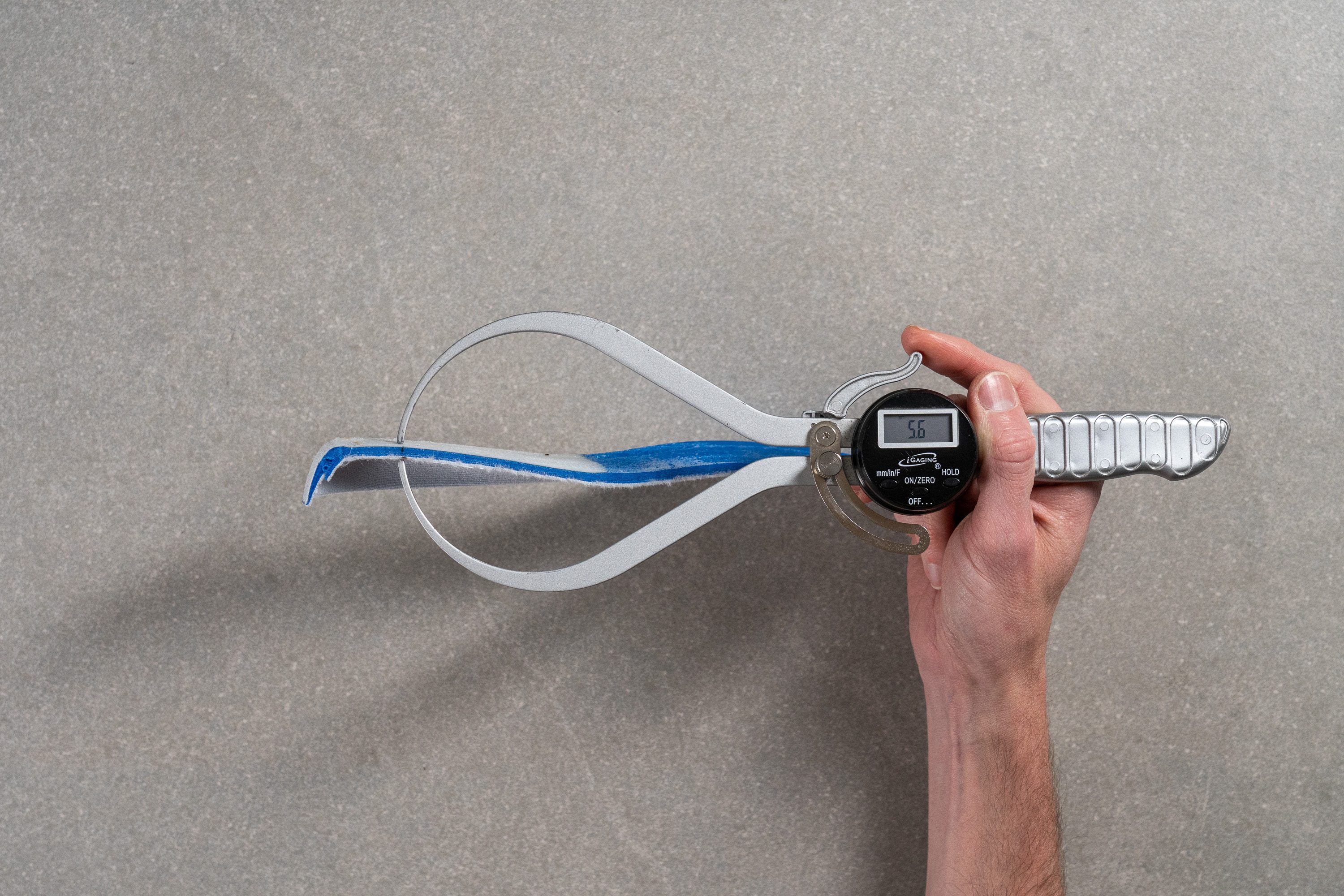
Our caliper showed 5.6 mm of thickness in the heel.
The insole is also divided in half by density - firmer in the heel for stability and softer in the forefoot for cushioning.
| G.T. Jump 2 | 5.6 mm |
| Average | 4.9 mm |
Removable insole
You can fine-tune the underfoot experience by replacing the shoe's stock insole.
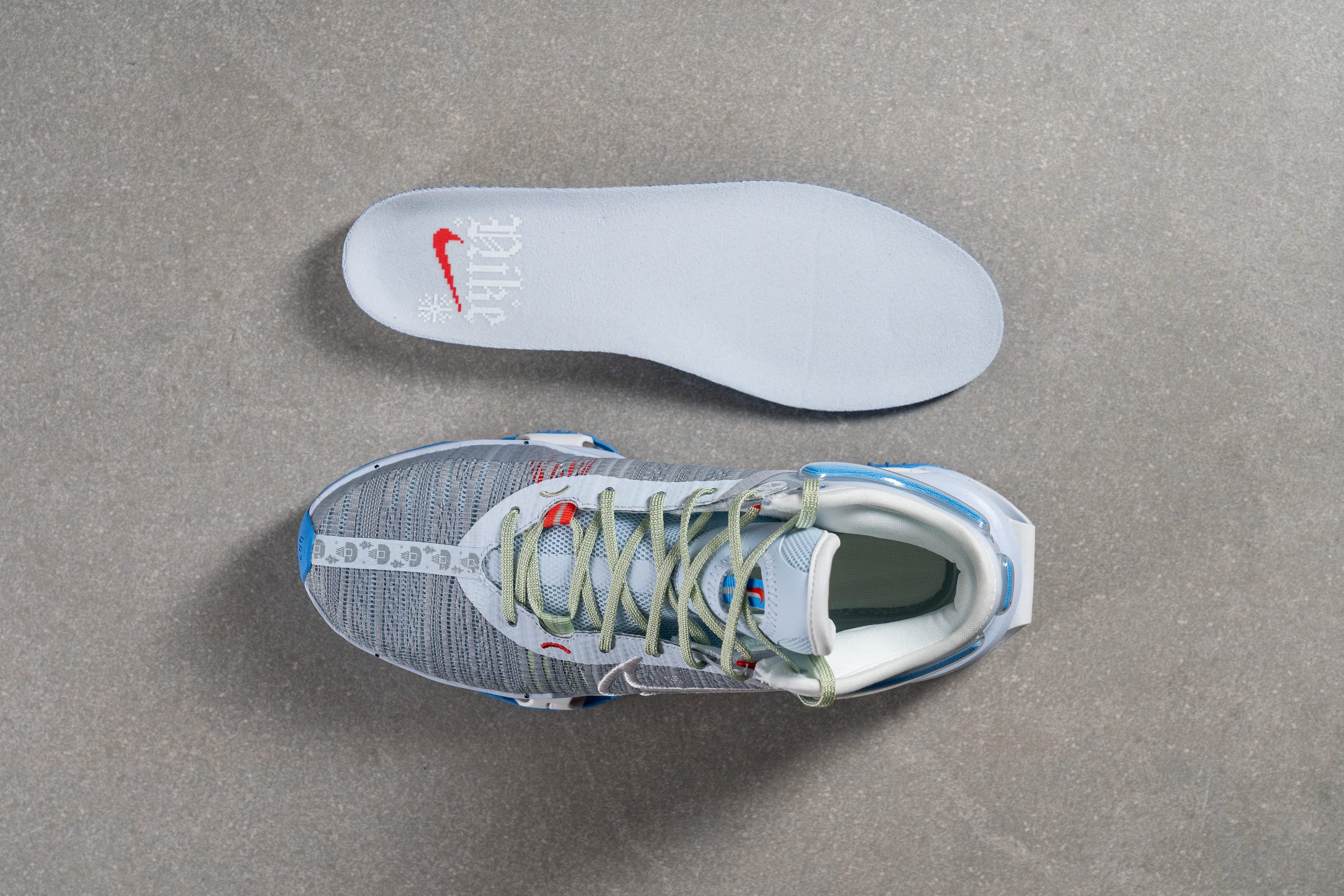
| G.T. Jump 2 | Yes |
Tongue padding
The tongue and collar of the G.T. Jump 2 are pretty lightly padded compared to the average.
Based on our caliper, the tongue is only 6.4 mm thick.
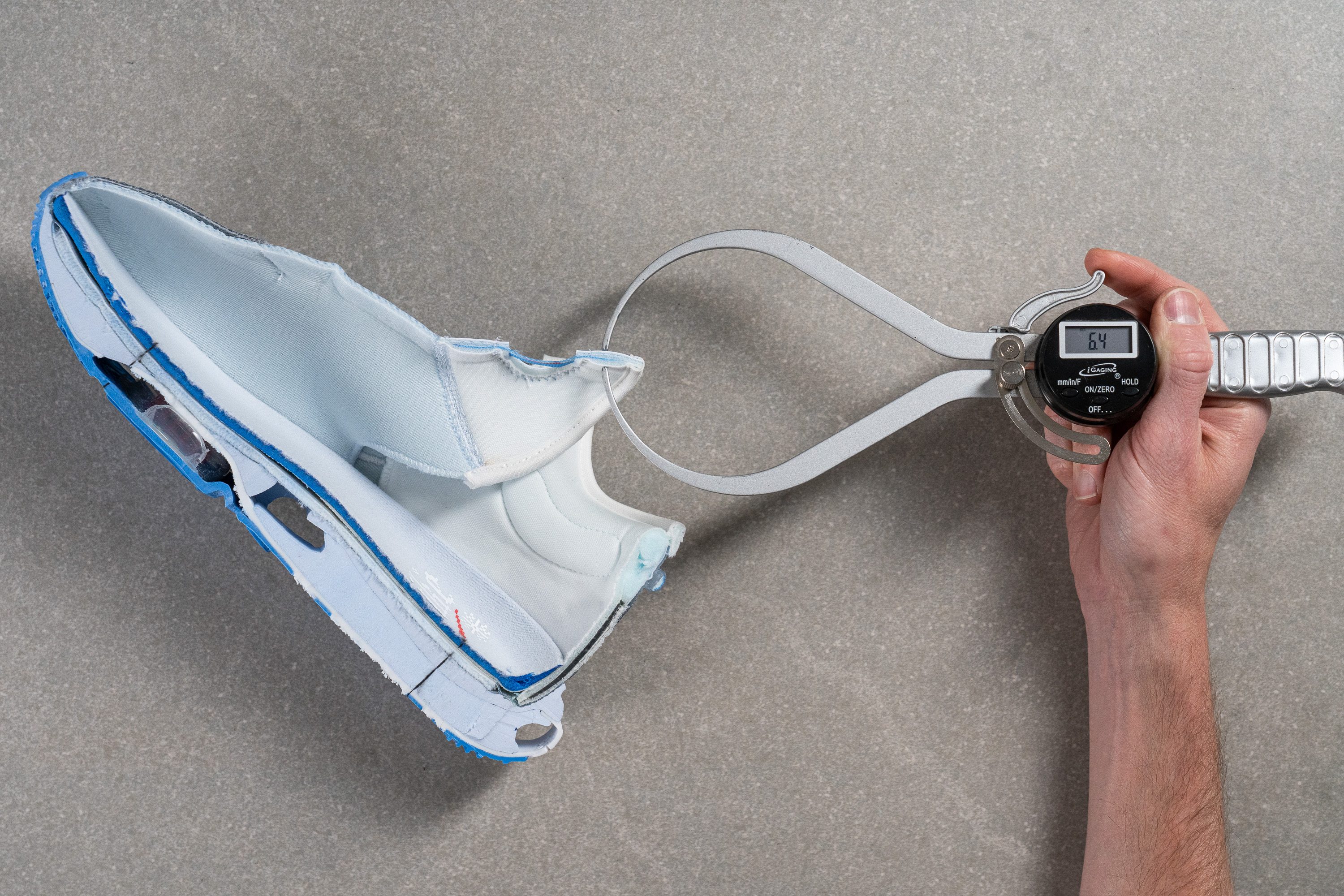
This is where the G.T. Jump 2 might feel odd to players who are used to the more substantial wrap around the instep and ankle.
| G.T. Jump 2 | 6.4 mm |
| Average | 9.3 mm |
Tongue: gusset type
The Nike G.T. Jump 2 features a bootie design in which the tongue is fully integrated into the rest of the upper.
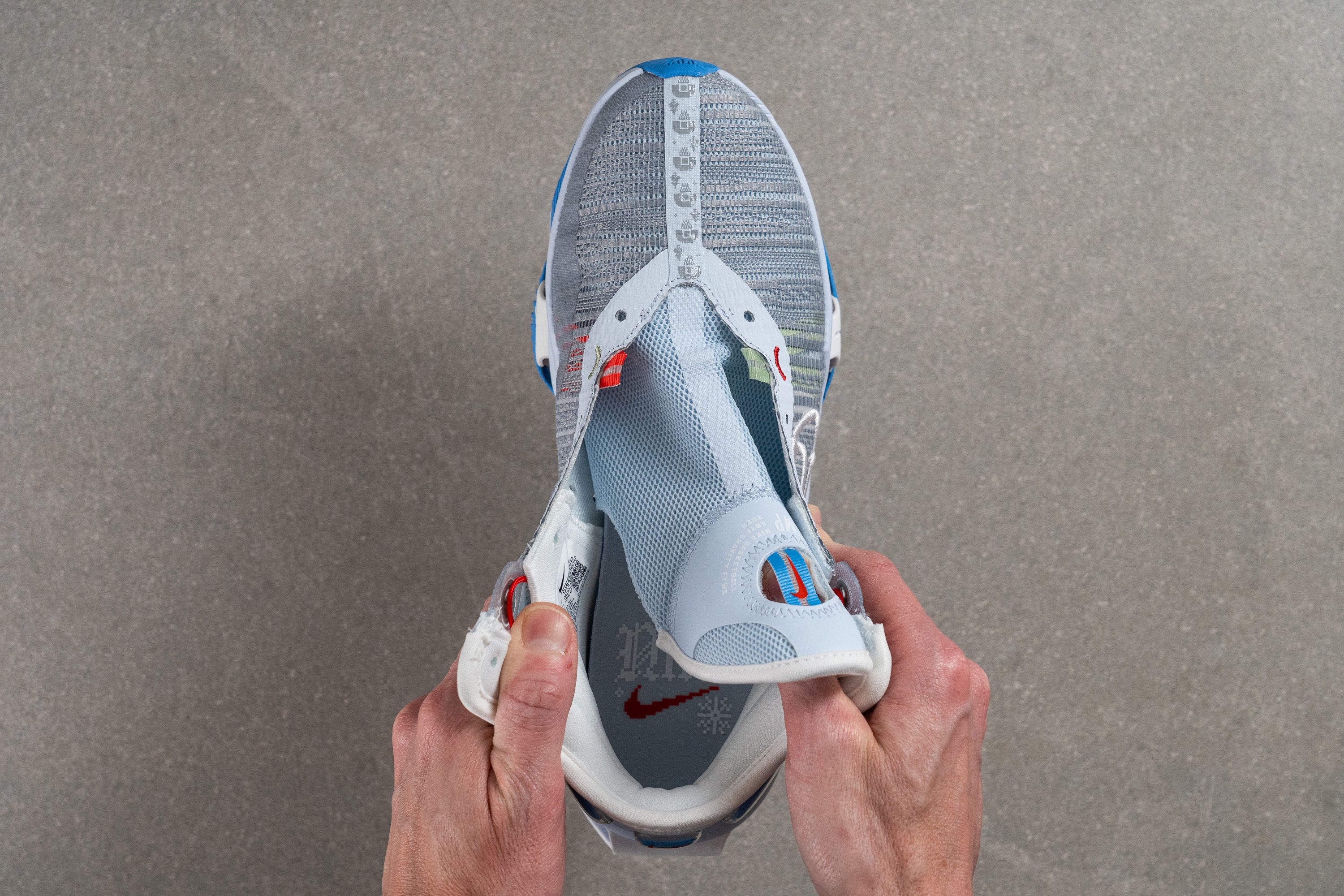
It is a common upper setup among basketball shoes which helps to create a more secure lockdown around the foot and ankle.
We experienced ZERO foot shifting inside this Nike shoe.
| G.T. Jump 2 | Bootie |
Heel tab
There is no heel tab at the back of this Nike shoe's collar.
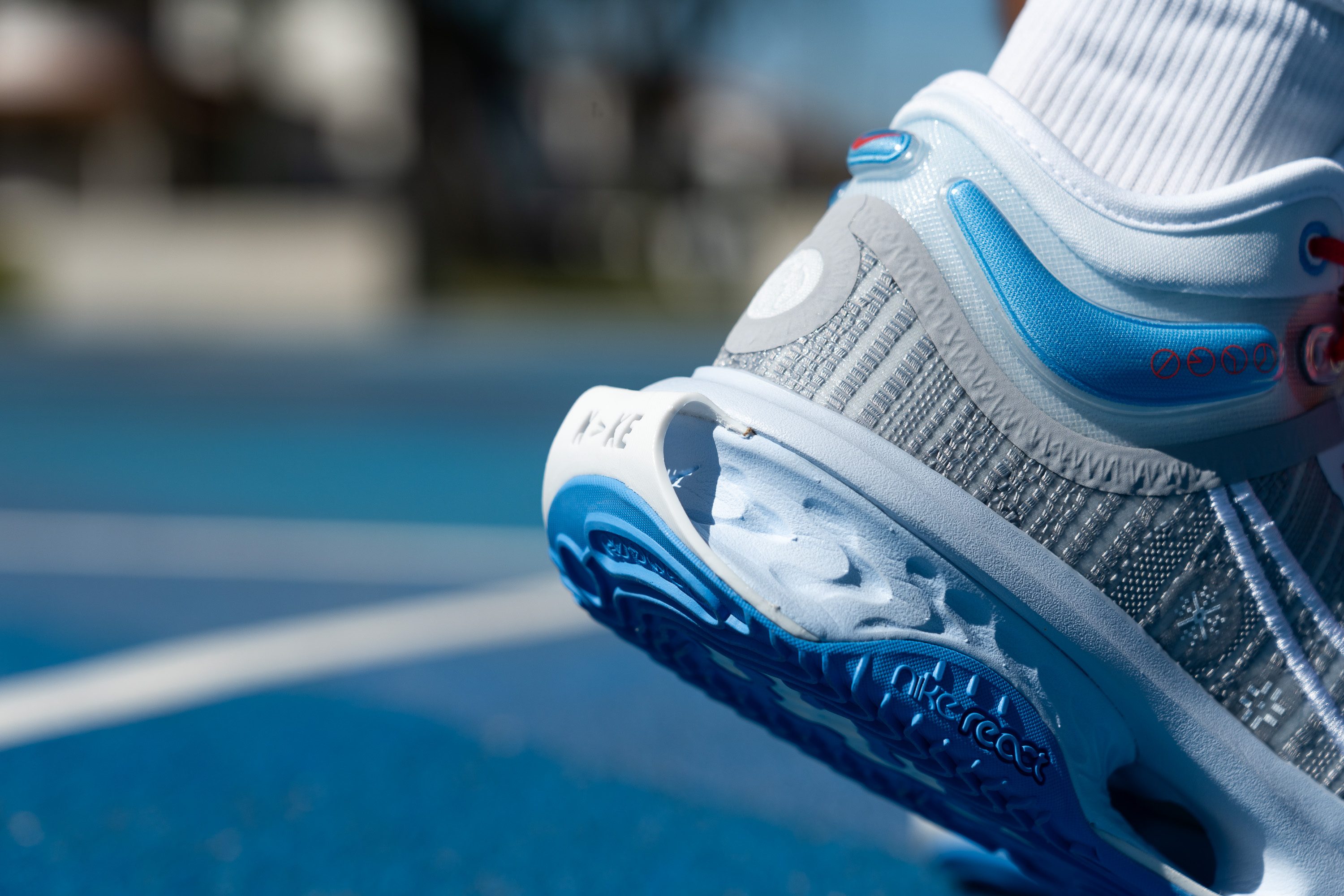
Don't mistake the loop at the shoe's heel for a finger loop. It is part of the shoe's cushioning system (the jump plate).
| G.T. Jump 2 | None |

